Text

“On the day of Pentecost all the believers were meeting together in one place. Suddenly, there was a sound from heaven like the roaring of a mighty windstorm, and it filled the house where they were sitting. Then, what looked like flames or tongues of fire appeared and settled on each of them. And everyone present was filled with the Holy Spirit and began speaking in other languages, as the Holy Spirit gave them this ability.” —Acts 2:1-4 (NLT)
“After this prayer, the meeting place shook, and they were all filled with the Holy Spirit. Then they preached the word of God with boldness.” —Acts 4:31 (NLT)
Today is Pentecost Sunday. Why do Christians celebrate Pentecost? Here are some insights from Crosswalk.com:
“Pentecost is a Christian holiday, observed on the seventh Sunday after Easter, that celebrates the blessing of the Holy Spirit upon the Apostles and other followers of Jesus Christ, as mentioned in the Acts of the Apostles (Acts 2:1-31). The day of Pentecost is known in the Christian Church as the day on which the Spirit descended upon the apostles. Guided by Peter's preaching, many thousands were converted in Jerusalem.
This year, Pentecost will be on Sunday, May 28th, 2023 occurring seven weeks after Easter Sunday (April 9). Why do Christians celebrate Pentecost? According to Ray Pritchard from Christianity.com, “Modern Christians observe Pentecost as a holiday, not to celebrate a wheat harvest, but to remember when the Holy Spirit invaded the Church in Acts 2.”
The description in Act 2 states that, after Jesus ascended into heaven, Jesus’ followers were gathered together for the Feast of Harvest (aka Pentecost), and the Holy Spirit “filled the whole house where they were sitting” (Acts 2:2). “All of them were filled with the Holy Spirit and began to speak in other tongues as the Spirit enabled them” (Acts 2:4). This unusual event drew a large crowd, and Peter stood up to speak to them about repentance and the gospel of Christ (Acts 2:14). By the end of the day that the Holy Spirit came, the Church grew by 3,000 people (Acts 2:41). This is why Christians still celebrate Pentecost.
Pentecost in the Bible:
Acts 2:1-4 "When the day of Pentecost came, they were all together in one place. Suddenly a sound like the blowing of a violent wind came from heaven and filled the whole house where they were sitting. hey saw what seemed to be tongues of fire that separated and came to rest on each of them. All of them were filled with the Holy Spirit and began to speak in other tongues as the Spirit enabled them."
John 14:26 "But the Advocate, the Holy Spirit, whom the Father will send in my name, will teach you all things and will remind you of everything I have said to you."
Exodus 32:22 "Celebrate the Festival of Weeks with the firstfruits of the wheat harvest, and the Festival of Ingathering at the turn of the year."
A Prayer for Pentecost:
Dear Heavenly Father, on this day, 2000 years ago, you inaugurated the church by having the Holy Spirit indwell in your believers. We rejoice that you have allowed us, men and women, Jew and Gentile, to experience new life. Thank you for the gift of the Holy Spirit, our comforter, our guide, and so many other things. And may we continue to celebrate this day until you return again. Amen."
Other links:
Bible Verses About Pentecost
5 Remarkable Things to Know About Pentecost Sunday
Prayers for Pentecost and Holy Spirit Power
#acts 2:1-4#acts 4:31#pentecost#the bible#jesus#bible verses#bible verses about pentecost#bible truths#the word of god#bible study#crosswalk.com#christian devotionals#daily devotionals#what is pentecost#christian blog#christian life#christian living#christian faith#christian inspiration#holy bible#god loves you
27 notes
·
View notes
Photo

And when the days of her purification according to the law of Moses were accomplished, they brought him to Jerusalem, to present him to the Lord; (As it is written in the law of the Lord, Every male that openeth the womb shall be called holy to the Lord; ) And to offer a sacrifice according to that which is said in the law of the Lord, A pair of turtledoves, or two young pigeons. - Luke 2:22-24 KJV
Through the years, I have met men, women and children who chose to become Christian, I wonder if I would have had the courage to believe, had I not been born into the Christian faith.
Today marks forty days since we celebrated Christmas, and so, we celebrate the Feast of the Presentation.
Mary and Joseph brought Jesus Christ to the temple at the prescribed time following the birth of a son and made their offering – the offering of a poor family. There were two people in the temple at the time, Simeon and Anna. Both are described as both old and devout Jews who had been waiting and hoping for the birth of the Messiah. Both recognized that Jesus was the One. Sometimes, I like to imagine that there were times like these where people were present at the event, but blind to its meaning. Would we have recognized Jesus?
Simeon was ready to die now that he had seen the Messiah. Anna gave thanks to God for sending the one who would redeem his people. What about us? Do we take God's presence for granted? Is Jesus just the baby at Christmas and the empty tomb at Easter, a reason for families to get together for feasting and celebrating? Do we feel that my life is complete now that we know Jesus Christ? Does having Jesus in my life fulfill us?
In times of difficulty, I ask Jesus to walk beside me and help me to carry my burden. Most of the time, I remember to thank Him for being there. But there are times when I forget. Instead of looking for material ways of being fulfilled and turning to drugs, alcohol, gambling, and other forms of pleasure, allow Jesus to fill your heart so that nothing else is needed. May we all be more like Simeon and Anna! May we all strive to be like Jesus Christ!
May He give us peace knowing He is with us and that He a plan for our lives. May our belief in Him and His Holy Word and in His endless power and possibilities draw us and others to Him daily. May we make sure that we give our hearts and lives to God and take time daily to seek and praise Him and share His Truth with the world. May the LORD our God and Father in Heaven help us to stay diligent and obedient and help us to guard our hearts in Him and His Word daily. May He help us to remain faithful and full of excitement to do our duty to Him and for His glorious return and our reunion in Heaven as well as all that awaits us there. May we never forget to thank the LORD our God and our Creator and Father in Heaven for all this and everything He does and has done for us! May we never forget who He is, nor forget who we are in Christ and that God is always with us! What a mighty God we serve! What a Savior this is! What a wonderful Lord, God, Savior and King we have in Jesus Christ! What a loving Father we have found in the Almighty God! What a wonderful God we serve! His will be done!
Thanks and glory be to God! Blessed be the name of the LORD! Hallelujah and Amen!
6 notes
·
View notes
Text
note-worthy
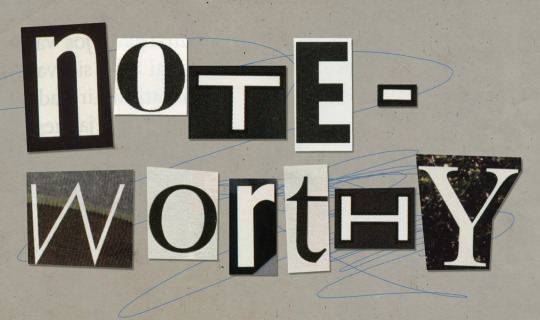
The last several weeks seemed to have been packed with so much going on, and the next several weeks will be the same. Seriously. That is why I want to share just some note-worthy things with you that are going on around my life.
I am grateful for all God is doing, what He has done and the things He will do in the days ahead.
Proverbs 3:27 NLT
Do not withhold good from those who deserve it when it’s in your power to help them.
One of my favorite ministries happens at the speedway in our community. Two times each year NASCAR comes to town, and our group gets to serve race fans. Long days. Even some struggles. But some sweet ministry took place at Martinsville Speedway through Raceway Ministries Martinsville. More than 100 people attended our worship service. 1,000’s of fans were saved with refreshments and with ADA golf cart rides.
Philippians 2:8 NLT
He humbled himself in obedience to God and died a criminal’s death on a cross.
Easter is one of the best and sweetest times of the year for the church and christians. We had some guests and some good times. And we got to celebrate the horror of the cross (yes, celebrate) and the fact of the empty tomb that gave way to our salvation.
Psalm 127:3 NLT
Children are a gift from the Lord; they are a reward from him.
And our daughter Ruth and family visited us around Easter. How sweet to have our grand children with us and enjoy time with our church. Some of our favorite times and making memories.
Ephesians 6:2 NLT
If you honor your father and mother, “things will go well for you, and you will have a long life on the earth.”
One of the things that was good but hard in the last month was the sell of dad’s home. It was the final thing to close out his estate and our saying good bye to him. Our mom passed away in 2015, and dad passed away in 2021. I miss them both. Seeing the house gone was tougher than I thought.
1 Corinthians 9:22-23 NLT
When I am with those who are weak, I share their weakness, for I want to bring the weak to Christ. Yes, I try to find common ground with everyone, doing everything I can to save some. 23 I do everything to spread the Good News and share in its blessings.
And what is coming next? In one week a group from our church and many other churches will converge on some of the coal mining communities of West Virginia to serve them in the name of Jesus. And the following week I head back to Cuba to serve with the sports ministry staff there.
Pray that these efforts will do all God wants to do… to lead others to Him.
These are just some note-worthy things, personal highlights if you will, going on in my life. Seems like these are full days, and they are. But God is good. May we stop and see how good He is even today!
#e-devotion#devotion#devo#note worthy#note#worthy#highlights#family#easte#raceway#raceway ministries#martinsville#speedway#easter#Jesus#cross#tomb#christian#parents#God#Michael Harrison#The Community Fellowship
1 note
·
View note
Text
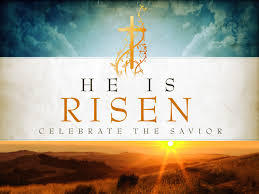
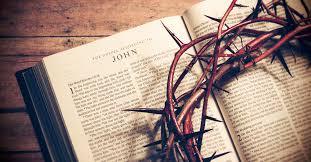





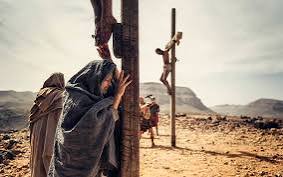


He is Risen!
Thank You Jesus!
You sacrificed all & paid for all our sins!
By Your Grace I am redeemed!
"Easter"
It's not the secular, nor the pagan, "celebration" of bunnies, painted eggs, hunts for candy, nor bouncy houses.
~It's to remember.~
Jesus was tortured.
To the death.
Not by the Romans.
But by the "religious leaders" afraid that He was "stealing" their power!
Pontius Pilate deemed Him innocent!
The crowds tortured, mocked, spat, cast stones,...
What hollywood nor anyone else wants to show...
He was naked on The Cross.
He bled.
Every drop of blood in His body until
He "bled" water.
They "washed" His wounds vinegar.
They "offered" Him sour wine.
This was after He had already been "tortured."
The Crucifixion was The Worst torture of a human being.
But humans took it further.
The soldiers knew how to make it worse than a "normal" crucifixion.
He was nailed in such a way that drawing breath was torture.
Jesus paid.
He paid, not because we deserved it.
But because God Almighty asked of it His Son.
But He knew...
His disciples denied Him.
Judas betrayed Him & brought this about.
Peter denied Him.
Three times.
The first pope of the original Church.
In the Ninth Hour, ~2pm, He drew His last breath.
&.
God Almighty.
DARKENED THE SKIES OF THE WORLD.
HE SHOOK THE GROUNDS.
HE TORE THE VEIL.
&.
people still didn't believe.
Those that did...
His family.
&.
Those of us that follow...
Christians.
Because...
He rose from the grave!!!!!
As I read the "Easter story", the crucifixion of my Savior, Jesus Christ.
I am horrified.
My soul weeps, I wail, my heart breaks.
&.
I thank Him.
Jesus Christ.
There is nothing deserving about humanity!
But by His Grace, Love, Mercy, & Sacrifice.
We all have the right, privilege, & chance to come to Him. In faith.
I write this, not because I am even remotely perfect, but because
His Is!
He sacrificed for
every single person ever to be borne,
every sin ever committed
So that we may be set free!
I only pray that everyone thanks Him.
With a moment of quiet thanks,
or a shout of Hallelujah joy!
We were each Created by God.
With the knowledge of our entire lifes before He Created the universe.
&
HE CREATED US ANYWAY!
Thank You Jesus!
Thank You God!
For loving me & Creating me, despite my sins & failings.
You did it anyway!
I for one am
Thankful. Grateful.
& truly humbly Blessed beyond measure to know He loves me!
Me.
His humble daughter.
His complex quirky warrior queen daughter.
~Tijgeress kat Phoenix. 🌱🌺
✝️☸⚓🌂🔗💫🙏👣🐾
🦉🐯🐐🐢🐛🦋🌱🌺🌳🌹🌻🌷🌳🧶🧵
🧭⚒⛓🧰👩🏫🕵️♀️👷♀️🏋️♀️🧗♀️🤺🧘♀️👩🎓🛀👙💋
🗝🔱⚜💝🐺🦌🐻🧩♠️♾❄🙇♀️🤲🕯🌟⚡🌠
The earth is the Lord's & everything in it. Ps.24.1
~True love always waits & true love never dies.~
Su.3.31.2024 2.48pm.est.🌅👑🤲🙏👣⚓🧭🕯
*pictures are from Google.
0 notes
Text
My Saturday Daily Blessings
May 28, 2023
Be still quiet your heart and mind, the LORD is here, loving you talking to you...........
Saturday of the Seventh Week of Easter (Roman Rite Calendar) Mass in the Morning Lectionary 302
First Reading:
Acts 28:16-20, 30-31
Responsorial Psalm:
Ps 11:4, 5 and 7
Verse Before the Gospel:
Jn 16:7, 13
**Gospel:
Jn 21:20-25
**Reflection:
Why do we often compare ourselves with others? Do we envy those who seem more fortunate than ourselves? Why did Peter question Jesus about John's future? Jesus had predicted that Peter was to suffer and die as a martyr for his faith. What would John's fate be? Jesus seems to indicate that John would live a long life - in fact he outlived all the other apostles.
Jesus says, "Follow me and you will have life in abundance" While Peter and John were both called as disciples of Jesus, each was given a particular task and mission to fulfill. When Peter questions John's role, Jesus responds, "What is that to you? Follow me!" Peter's given task was to "shepherd the sheep of Christ," and in the end to die as a martyr for the Lord Jesus. John's role was preeminently to witness to the risen Lord Jesus and to give his testimony to the Gospel account of Jesus' identity as the divine Son of God who became a man to save us from sin, Satan, and death (John 20:31). John lived to long age and wrote the Gospel as his testimony to the reality of the resurrection of Jesus Christ.
Jesus does not cease to do great works of power and love through his people today John ends his Gospel with an astonishing remark: "Human books cannot exhaust the person and work of Jesus Christ." His power is inexhaustible, his grace is limitless, his wisdom unfathomable, his triumphs are innumerable, and his love is unquenchable. We can never say enough of the power, majesty and glory which belongs to Jesus Christ alone. Do you witness to others the joy of the Gospel message that Jesus died for us to bring us new life, freedom, love and power to live as his disciples?
May the power of your love, Lord Christ, fiery and sweet as honey, so absorb our hearts as to withdraw them from all that is under heaven. Grant that we may be ready to die for love of your love, as you died for love of our love." (Prayer of Francis of Assisi, 1182-1226)
Sources:
Lectionary for Mass for use in the Dioceses of the United States, second typical edition, copyright (c) 2001, 1998, 1986, 1970 Confraternity of Christian Doctrine; Psalm refrain (c) 1968, 1981, 1997, international committee on english in the liturgy, Inc All rights reserved. Neither this work nor any part of it may be reproduced, distributed, performed or displayed in any medium, including electronic or digital, without permission in writing from the copyright owner.
**Meditations may be freely reprinted for non-commercial use - please cite: copyright © 2023 Servants of the Word, source: dailyscripture.net, author Don Schwager
0 notes
Text
“Doubt, Peace, and Blessing” based on Acts 1:3-5, 12-14 and John 20:19-30
I care about a lot of things, and I care a lot about people and that can be challenging. I know at least some of you know what I mean. Loving people is a great and wonderful thing, but there is a lot of pain out there and it can be overwhelming.
Julian of Norwich said, “And all shall be well, and all shall be well, and all matter of thing shall be well.” And I want to argue back.
I can make good arguments!
But I'm not going to share them with you.
Today I want to talk about how she is right. First, I have to note that she speaks in the future tense. She did not claim that all was well. She didn't dismiss the suffering of her day. Instead, she speaks of hope in the power of Divine Love, she speaks resurrection, she speaks of the kindom that will come.
“And all shall be well, and all shall be well, and all matter of things shall be well.”
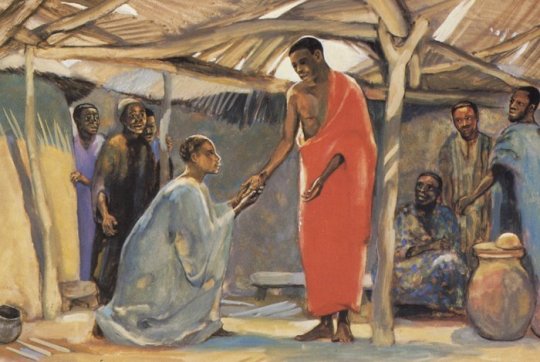
Now, I think Thomas is the disciple for the rest of us. I adore the guy. I love how brave he is to be the one who went out when the rest of the disciples locked themselves in. I figure he was the one gathering up supplies for everyone. I love how honest he is about his disbelief. I love how is is the stand in for the rest of us who would also NOT see Jesus appear in the upper room. And I love how when he comes across new information, he changes his mind. He said he wouldn't believe until he saw. He saw, and he believed. I love his devotion to Jesus and to Jesus' followers. I love his resilience in being dismissed over and over again in the history of Christianity and still having such power to help us. And, of course, I love that he – like the others - was blessed with peace. Because I always love that blessing. I love that Jesus appeared showering his grieving followers with “blessed wholeness for each and all of you” and I love that we greet each other with those words in worship to this day.
So, right, I love Thomas.
And, as it turns out, I love doubts because they're real. I love when Thomas just says, “I will not believe.” I love it when people say that to me too. I particularly love it when people name for me something they think they're supposed to believe and don't, and I'm able to say to them that I don't think they have to believe that afterall.
Most of the time I'm also able to say I don't believe it either. I learned the power of hearing that from a pastor when I was a teenager. I had come to have serious doubts about hell. It just didn't make any sense to me that a God who loves people would send anyone to hell. I didn't think God's love was that small or powerless. I made an attempt to talk to my own pastor about it and he informed me that believing in hell was a requirement of Chrsitianty. Or something. I don't really remember anything other than being told I couldn't believe what I believed. I kept my mouth shut for quite some time afterwards, but maybe a year and a half later (I think I was 13), I was at camp and we were doing Bible Study in the woods and the topic seemed to come up and I brought it up softly. Something like, “I'm not sure that I believe in hell.” The pastor with us heard me, and told me that I should trust myself and believe what I believed.
He opened the door for me.
(Clearly I went ahead and walked all the way through.)
I think my favorite part of this story is that the pastor, who is still a mentor, doesn't remember it. It was just a normal part of his ministry to empower people, and to affirm God's love, and it wasn't notable for him at the time. But I'm not sure I would have stayed in Christianity without him.
Right. So I love doubts. And I love your doubts.
In preparing for this second Sunday of Easter I found myself wondering, “What do we REALLY doubt?” I mean we as a community, which may be different from any of us individually. And I may not know. But my best guess is that we doubt, “And all shall be well, and all shall be well, and all matter of things shall be well.”
For good reasons, and those are OK.
But for some bad reasons too. I think we may doubt it because the 24 hour news cycle fills up our hearts and minds with stories chosen by the principal “if it bleeds, it leads.” I think we may doubt it because social media has no conscience. I think we may doubt it because human nature tends to spend more attention on the bad then the good, requiring 5 times as much good as bad for it to get the same amount of attention. I think we may doubt it because we've been trained in or bought into the scarcity mentality. I think we may doubt because someones, somewheres, think it is good for sales if we are hopeless and uncomfortable and they're good at marketing.
That's a lot of pressure on us NOT to have hope.
It is coming at us from all directions all the time.
Dear ones, I would like us to build some resilience around ourselves, so we can let hope be nurtured and grow in us. So I want to remind you of some things that are just truly good news. Every day people leave domestic violence. And some of they stay away and never experience it again. Every day people get sober after a long experience with addiction, and some of them stay sober for the rest of their lives. Every day people who have lived through trauma find ways to keep going, to share love, to heal, to make it through. And that means that trauma doesn't have the last word. Every day science and medicine advance and make a fuller life possible for people who didn't have hope yesterday.
Friends, the coal industry just had a TERRIBLE first quarter.
And, you know, those African American legislators in Tennessee got their seats back. And the white woman who protested with them named racism as the reason she wasn't kicked out, re-centering them in the conversation.
Loving relationships exist.
And, dear ones, spring comes every year and the sun rises every morning and sets every night. There is plenty of hope to ground ourselves in.
I don't think God needs any of us to feel more guilty, to be more overwhelmed, or to have superficial knowledge of more problems.
I think God needs more people grounded in hope. So I want to ask you to pay attention to your lives. What drains your energy? What builds your energy up? Thank goodness, we're all different and that means the answers will be different. Otherwise everyone would want to be an bus driver and no one an accountant.
Friends, please, for the love of God, take your need to rebuild your energy seriously. Do things you love. It is a form of resilience. It is a form of nurturing hope. It is a
form of faith.
So, let's get practical. What do I mean? I mean, talk with people you laugh with. Try new things that make you a little nervous. Notice flowers when you are out and about. If you are like me, take as much time as you can to savor the silence and let it heal you from the inside out. If you are nothing like me, go to a really loud concert and let it heal you from the inside out. Look for beauty. Pay attention to goodness. Give yourself a break.
I think our doubts are likely related to doubting that we deserve good things, like the stuff that restores us. But Jesus blessed with all with comfort, hope, and peace – the peace that is blessed wholeness for us and for all. We have doubts, all of us, right? And that's OK. But may we nurture hope by letting God help us nurture our God-given energies. For good. For peace. For hope.
“And all shall be well, and all shall be well, and all matter of things shall be well.” Amen
Rev. Sara E. Baron First United Methodist Church of Schenectady 603 State St. Schenectady, NY 12305 Pronouns: she/her/hers http://fumcschenectady.org/ https://www.facebook.com/FUMCSchenectady
April 16, 2023
#thinking church#progressive christianity#fumc schenectady#first umc schenectady#schenectady#umc#sorry about the umc#rev sara e baron#Easter#Thomas#julian of norwich
0 notes
Text
Gospel News
Dear friends and members of Fort Lee Gospel Church,
I trust you are enjoying the goodness of God in your life. Today I will address, hope during the Spring season, St. Patrick, and Passion Week.
Hope in the Season of Spring
The calendar says that Spring starts next Tuesday, March 19th. The weather and Spring flowers seem to say Spring starts this week. I hope you have time to enjoy God’s creation this week. In the words of Psalm 19:1, “The heavens declare the glory of God; the skies proclaim the work of his hands.”
One of the blessings of this time of year is the theme of HOPE. After a cold season, we have hope of warmer weather coming. After long nights and short days, we have hope for longer days and evenings spent outside with friends and family, enjoying the daylight.
Approaching Easter Week is also a time to celebrate hope. For the followers of Jesus, all hope was lost when Jesus was nailed to the cross. Resurrection Sunday brought hope again.
The core concept around becoming a Christian is tied to hope and new life. In talking with an important Jewish leader, Jesus said, “Very truly I tell you, no one can see the kingdom of God unless they are born again.” (John 3:3) When we confess our sins, believe in Jesus, and receive God’s offer of salvation, we are ‘born again.’
As nature comes alive again in this season of Spring, we have an illustration of what God wants to do in the life of a person separated from God because of unbelief and sin. Jesus came so that spiritually dead can live again. Jesus came to earth that we might have eternal life.
I pray that Spring 2024 will be a season of refreshment, revival or new life in Christ for each of us. May the God of Creation recreate the life of Christ in you!
St. Patrick’s Day – March 17
This Sunday we highlight St. Patrick’s Day in America. For many in our culture the focus is on green food coloring and beer. I strive to remind anyone who will listen, that Patrick was one of the greatest missionaries to preach the gospel since the Apostle Paul.
Patrick took the Great Commission seriously which says, “But you will receive power when the Holy Spirit comes on you; and you will be my witnesses in Jerusalem, and in all Judea and Samaria, and to the ends of the earth.” (Acts 1:8) St. Patrick was a witness for Christ as he evangelized Ireland.
When Patrick moved to Ireland with a small group of Christ followers in the 5th Century, Ireland was steeped in superstition, witchcraft, and oppression. Patrick brought the good news of freedom in Christ which radically changed the nation.
Rarely does one individual shape the destiny of a people group in the way that Jesus through Patrick changed Ireland. For those of us who love Jesus, there is much to celebrate in the life and impact of Patrick, Apostle to Ireland!
Passion Week: March 24 – 31
Here are some of the ways you can join us remembering Jesus this Holy Week:
Palm Sunday, March 24
Palm Sunday marks the day Jesus entered Jerusalem and was welcomed as the King of the Jews. Our 11:00 PM Worship Service will meet as we do every week, with added celebration and joy. Palm branches will be available as we remember Jesus as King of our lives. We welcome you to join us for our Fellowship Meal after the service.
Passover Seder Meal, March 26
In recent years we developed a Passover Seder tradition where we replicate the Last Supper that Jesus shared with his disciples in the upper room. We plan to meet in the church fellowship hall for a full lamb meal. The program will start at 6:00 PM, include singing of hymns, reading of the Passover account, explaining the fulfillment of Jesus as the Passover Lamb, and sharing dinner.
We share the Passover Seder on Tuesday with the understanding that the traditional day for this event is Thursday. We made this adaption because of scheduling issues in our building and Tuesday being our usual Bible Study evening. There will be no livestreaming option. Join us as you are able.
Good Friday, March 29
Our Good Friday service is a solemn and reflective service that remembers the day Jesus died on the cross for our sins. We meet in the church sanctuary at 7:30 PM and there will be a livestream option. The service includes hymns, liturgy, readings, preaching, and the Lord’s supper.
Resurrection Sunday, March 31
We start the most important Sunday of the year with a Sunrise Service at 6:30 AM. Weather permitting, we meet at Monument Park, across from the church for an outdoor service. In case of rain or extreme cold, we meet indoors. We do this early service as a remembrance of the women who came to the tomb early in the morning and found that Jesus was not there.
This brief service (under 30 minutes) is followed by breakfast back at the church.
Our second resurrection service is at 11:00 AM in keeping with our weekly practice. We celebrate Jesus breaking the power of sin and death in this joyous service.
I pray that this year the hope of Easter week will deepen your faith and commitment to God, strengthen your gratitude for what Jesus has done, and grow your involvement in God’s work in His world. Christ has risen! He has risen indeed!
Weekly Announcements
Sunday worship services at 11:00 AM continue to be livestreamed on our Fort Lee Gospel Facebook page, YouTube channel, and our website, www.fortleegospel.org. We meet in the building where we include a time of worship after the online portion of the service.
The Tuesday Men’s Lunch and study meets at the church at 12:30 PM. On Tuesday, March 19, we will go to the Day Laborers ministry in Palisades Park.
The Tuesday Bible Study meets at 7:00 PM weekly. We have started studying the book of Romans.
The 6:00 AM Prayer Meeting on Wednesdays and Saturdays is at the church with an option to connect on Google Meet.
The Women’s Bible Study meets on alternating weeks including this Saturday, March 16th at 2:00 PM. The group has started a new study from the book of Ephesians.
Connect info for Tuesday Bible Studies and Morning Prayer is:
Meeting URL : https://meet.google.com/suk-xpsf-nwh
For dial in: Phone: +1 567-351-1104 PIN: 469 349 929#
0 notes
Text
A pre-Easter post, thoughts from a gay Christian (long post)
So, in these days leading up to Good Friday and Easter Sunday, I've been trying to read through the Easter Story in my Bible and the verses/chapters related to it. Although I feel like I've read the story a billion times, I always feel as though every Easter is spent reading this story with other people, hearing other people's interpretations of how Easter played out and Jesus's crucifixion in other people's words. For the longest time, I spent Easter thinking of it as a communal holiday (as in community with people, it's obviously related to the taking of the communion lol), and even then, it is a holiday to be enjoyed with other people who celebrate Easter, completely. However, I think for the longest time I commercialized it in my head as a kid, saw it as this super exciting thing with fun colorful clothes that everyone wears and Easter egg hunts and fun food, and when the games were taken out of it as I grew, I think I diminished it to nothing, as some holiday that "doesn't matter anymore".
All that to say, as someone who's been quarantining since last March, I've spent over a year now, for the most part, in solitude. As a person who may potentially be celibate as an adult, I recognize that this is an exaggerated version of how life at home may be for me forever. And this year has really caused me to realize how completely essential it is for me to keep communicating with God, keep praying, keep depending on Him. Obviously, it's important for all Christ followers to do this. However, I've recognized that praying and reading the Bible and speaking to God as myself, not some over-glorified version of how Christians think other Christians "should be" is one of the few things keeping my head on my shoulders, one of the few things that doesn't make me feel so lonely I feel like the inside of my head is screaming. And I feel like learning to better recognize and celebrate and prepare my heart for something like Easter is such an important thing for me to do as a gay Christian who may potentially be celibate.
This is the story of what our religion and faith and celebration is really all about. This is the fundamental part, the core. Jesus literally died for all people living on the Earth past, present and future. Cishet and queer, of all socio-economic statuses, of all races and abilities and neurotypes and ages. The celebration of this holiday is celebration that the claim "God hates f*gs" is not only wholly inaccurate, but also blasphemous and contradicts every essence of God's being. This is a holiday for queer people like me, and other people who have been treated like they were "too filthy" to enter the walls of certain churches, this is a celebration of the acknowledgement that some churches don't represent the essence of God. This is a holiday for people who love their neighbors, people who have lost their neighbors, people who grieve losing someone and people who grieve being lost by someone. Sometimes I see Easter treated as some "all American" holiday where conservative families do their once a year church run because that's the mainstream thing to do, and I feel discouraged because it is treated like some holiday only accessible to the people who hold signs outside of pride marches and tell people to repent and stop being queer, the people who hold God, America and football all at the same height of importance, and have the gall to jeer at people who honor God in ways that they deem to be "un-American".
But this year, I am taking extra care to read the Bible closely in these days leading up to Good Friday and Easter. I read Psalm 22, and I will read about Palm Sunday, I'll read about the Passover and Jesus in the Garden of Gethsemane, and how Jesus washed his disciples feet. I'll spend careful time reading about how Jesus spoke to the criminal on the cross next to Him, the way that Jesus treated Thomas even though Thomas went through doubt, the way that Jesus healed the ear of the person who was against him and reprimanded his disciple who cut the ear off. I'll read about the horrific ways that Jesus was treated and crucified by the ultra-religious, political and self righteous leaders at that time, the way that he was sneered at and treated as vermin even though he never, ever deserved it. I'll think about how Jesus thought of each and every one of us as he died and the fact that he saw his mother and those closest to him at the foot of the cross in anguish, begging him to not die, the fact that ultimately what those who crucified him hated the most about him was his determination to love every person he interacted with and treat them with dignity and respect, humanity. The fact that he defended a prostitute and protected her from the perverted political leaders who brought her to Jesus in an attempt to take her dignity away before stoning her. I'll never forget that Jesus was crucified because the self-righteous couldn't handle the idea that a perfect God could truly love every imperfect person, not just the ones who managed to hide their imperfections using their high socio-economic status or the laws that they had partial control in.
And on Good Friday, I will grieve the crucifixion of a perfect savior who chose to fully love people like me, crucified by people like those who would try to convince me that I am going to hell despite believing in Jesus, simply because I am not straight.
And once Sunday comes, I will let myself cry, if I want to. I will thank God that He fights for me, even when those who go against me claim to follow Him. I will thank Jesus for thinking of imperfect people like myself when he was on that cross and I will truly mean it because I do- my gratefulness for the fact that such a perfect God thinks of me, let alone loves me, is something that grows exponentially the more I grow and realize how truly big and terrible the amount of hate in the world is.
And after Easter, I will remember how Jesus treated those who hated him for not being the type of self-righteous ultra political-religious person they were wanting him to be, and I will remember that as a Christ follower, our biggest goal should be to strive to be like Jesus. So I will remember, although life can be difficult in a world and a time where many many people see the concept of gay Christians as a simple impossibility, that I am here for a reason, and I've been made the way I am and in this time for a reason. I will remember to bless those who persecute me, instead of cursing them, rejoicing with those who rejoice, and weep with those who weep. I will remember that those who are persecuted on Earth will be highly rewarded in Heaven, and that the loving and protecting of a neighbor who has been hurt can do much more than fighting someone who only wants to be correct at the end of the day. I will continue to pray that God changes the minds of those in the church who struggle to believe that Jesus died for everyone and if God wants to use me in that process, so be it. But as I stay primarily in solitude throughout quarantine, I will pray that God opens my mind and helps me love others because I know that I am just as at fault as everyone else in this respect. I will spend this time reading His word and praying about it, asking questions and allowing myself to be emotional if I want or need to.
I know this was long, but if you made it all the way down here, hi! Thanks for reading all that, and if you're also a Christ follower and you celebrate Easter, I'd love to hear some of your thoughts on Easter and some things you like about it!
If I remember, I will try to keep adding updates on my account about chapters/stories/verses I've read or any new thoughts I have in this process!
Love you~
Doodlebug <3
#Good Friday#Holy Week#Easter#Jesus#crucifixion#Christian#gay Christian#Bible reading#Happy almost Easter!#Easter Sunday#Happy Holy Week#Jesus went to the Mount of Olives today#Yesterday was the iconic day when Jesus cleared the temple#Tomorrow is Holy Wednesday#And the day after that will be the iconic Maundy Thursday#And most of y'all know how the rest of this goes
21 notes
·
View notes
Photo
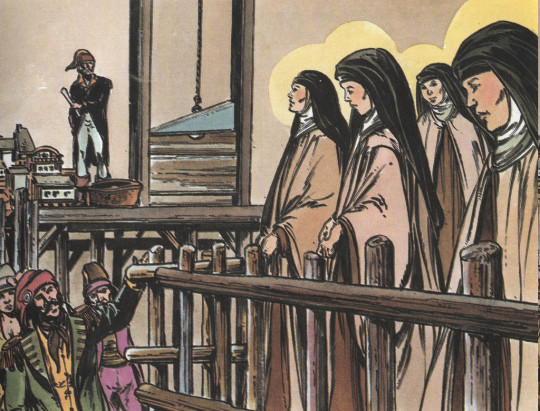
July, The Month Dedicated to the Most Precious Blood
THE SIXTEEN CARMELITE MARTYRS OF COMPIEGNE
The French Revolution reveals the titanic struggle between good and evil. During the terror, over 40,000 Frenchmen were executed just for holding fast to the Catholic Faith and objecting to the worst excesses of the Committee of Public Safety. The blood lost in the years of 1792-1794 staggers the imagination even in the retelling and the campaign against the Church was as diabolical as it was cruel.
Contemplative religious communities had been among the first targets of the fury of the French Revolution against the Catholic Church. Less than a year from May 1789 when the Revolution began with the meeting of the Estates-General, these communities had been required by law to disband. But many of them continued in being, in hiding. Among these were the community of the Carmelite nuns of Compiegne, in northeastern France not far from Paris -- the fifty-third convent in France of the Carmelite sisters who followed the reform of St. Teresa of Avila, founded in 1641, noted throughout its history for fidelity and fervor. Their convent was raided in August 1790, all the property of the sisters was seized by the government, and they were forced to discard their habits and leave their house. They divided into four groups which found lodging in four different houses all near the same church in Compiegne, and for several years they were to a large extent able to continue their religious life in secret. But the intensified surveillance and searches of the "Great Terror" revealed their secret, and in June 1794 most of them were arrested and imprisoned.
They had expected this; indeed, they had prayed for it. At some time during the summer of 1792, very likely just after the events of August 10 of that year that marked the descent into the true deeps of the Revolution, their prioress, Madeleine Lidoine, whose name in religion was Teresa in honor of the founder of their order, by all accounts a charming perceptive, and highly intelligent woman, had foreseen much of what was to come. At Easter of 1792, she told her community that, while looking through the archives she had found the account of a dream a Carmelite had in 1693. In that dream, the Sister saw the whole Community, with the exception of 2 or 3 Sisters, in glory and called to follow the Lamb. In the mind of the Prioress, this meant martyrdom and might well be a prophetic announcement of their fate.
Mother Teresa had said to her sisters: "Having meditated much on this subject, I have thought of making an act of consecration by which the Community would offer itself as a sacrifice to appease the anger of God, so that the divine peace of His Dear Son would be brought into the world, returned to the Church and the state." The sisters discussed her proposal and all agreed to it but the two oldest, who were hesitant. But when the news of the September massacres came, mingling glorious martyrdom with apostasy, these two sisters made their choice, joining their commitment to that of the rest of the community. All made their offering; it was to be accepted.
After their lodgings were invaded again in June, their devotional objects shattered and their tabernacle trampled underfoot by a Revolutionary who told them that their place of worship should be transformed into a dog kennel, the Carmelite sisters were taken to the Conciergerie prison, where so many of the leading victims of the guillotine had been held during their last days on earth. There they composed a canticle for their martyrdom, to be sung to the familiar tune of the Marseillaise. The original still exists, written in pencil and given to one of their fellow prisoners, a lay woman who survived.
Give over our hearts to joy, the day of glory has arrived, Far from us all weakness, seeing the standard come; We prepare for the victory, we all march to the true conquest, Under the flag of the dying God we run, we all seek the glory; Rekindle our ardor, our bodies are the Lord's, We climb, we climb the scaffold and give ourselves back to the Victor.
O happiness ever desired for Catholics of France, To follow the wondrous road Already marked out so often by the martyrs toward their suffering, After Jesus with the King, we show our faith to Christians, We adore a God of justice; as the fervent priest, the constant faithful, Seal, seal with all their blood faith in the dying God....
Holy Virgin, our model, August queen of martyrs, deign to strengthen our zeal And purify our desires, protect France even yet, help; us mount to Heaven, Make us feel even in these places, the effects of your power. Sustain your children, Submissive, obedient, dying, dying with Jesus and in our King believing.
On July 17 the sixteen sisters were brought before Fouquier-Tinville. All cases were now being disposed of within twenty-four hours as Robespierre had wished; theirs was no exception. They were charged with having received arms for the emigres; their prioress, Sister Teresa, answered by holding up a crucifix.
"Here are the only arms that we have ever had in our house."
They were charged with possessing an altar-cloth with designs honoring the old monarchy (perhaps the fleur-de-lis) and were asked to deny any attachment to the royal family. Sister Teresa responded: "If that is a crime, we are all guilty of it; you can never tear out of our hearts the attachment for Louis XVI and his family. Your laws cannot prohibit feeling; they cannot extend their empire to the affections of the soul; God alone has the right to judge them." They were charged with corresponding with priests forced to leave the country because they would not take the constitutional oath; they freely admitted this. Finally they were charged with the catchall indictment by which any serious Catholic in France could be guillotined during the Terror: "fanaticism." Sister Henriette, who had been Gabrielle de Croissy, challenged Fouguier-Tinvile to his face:
"Citizen, it is your duty to respond to the request of one condemned; I call upon you to answer us and to tell us just what you mean by the word 'fanatic.'"
"I mean," snapped the Public Prosecutor of the Terror, "your attachment to your childish beliefs and your silly religious practices."
"Let us rejoice, my dear Mother and Sisters, in the joy of the Lord," said Sister Henriette, "that we shall die for our holy religion, our faith, our confidence in the Holy Roman Catholic Church."
While in prison, they asked and were granted permission to wash their clothes. As they had only one set of lay clothes, they put on their religious habit and set to the task. Providentially, the revolutionaries picked that "wash day" for their transfer to Paris. As their clothes were soaking wet, the Carmelites left for Paris wearing their "outlawed" religious habit. They celebrated the feast of Our Lady of Mount Carmel in prison, wondering whether they would die that day.
It was only the next day they went to the guillotine. The journey in the carts took more than an hour. All the way the Carmelite sisters sang: the "Miserere," "Salve Regina," and "Te Deum." Beholding them, a total silence fell on the raucous, brutal crowd, most of them cheapened and hardened by day after day of the spectacle of public slaughter. At the foot of the towering killing machine, their eyes raised to Heaven, the sisters sang "Veni Creator Spiritus." One by one, they renewed their religious vows. They pardoned their executioners. One observer cried out: "Look at them and see if they do not have the air of angels! By my faith, if these women did not all go straight to Paradise, then no one is there!"
Sister Teresa, their prioress, requested and obtained permission to go last under the knife. The youngest, Sister Constance, went first. She climbed the steps of the guillotine "With the air of a queen going to receive her crown," singing Laudate Dominum omnes gentes, "all peoples praise the Lord." She placed her head in the position for death without allowing the executioner to touch her. Each sister followed her example, those remaining singing likewise with each, until only the prioress was left, holding in her hand a small figure of the Blessed Virgin Mary. The killing of each martyr required about two minutes. It was about eight o'clock in the evening, still bright at midsummer. During the whole time the profound silence of the crowd about the guillotine endured unbroken.
Two years before when the horror began, the Carmelite community at Compiegne had offered itself as a holocaust, that peace might be restored to France and the Church.
The return of full peace was still twenty-one years in the future. But the Reign of Terror had only ten days left to run.
Years of war, oppression and persecution were yet to come, but the mass official killing in the public squares of Paris was about to end. The Cross had vanquished the guillotine. These sixteen holy Carmelite nuns have all been beatified by our Holy Father, the Pope, [Pope St. Pius X, 27 May 1906] which is the last step before canonization.
Blessed Carmelites of Compiegne, pray for us!
127 notes
·
View notes
Text
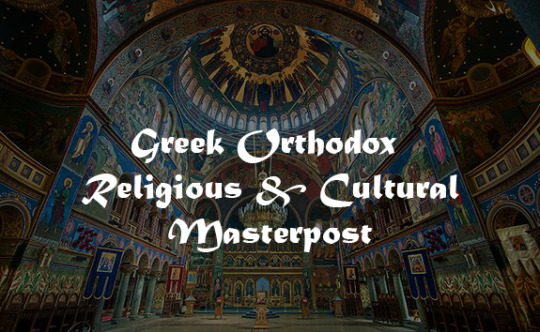
This post is based on my knowledge of traditions of the north and center mainland of Greece. However, I am pretty sure most of those things apply to Greek Orthodox people universally. Needless to say, each village and town can has its own local traditions when it comes to religious occasions.
I am a Greek Orthodox living in Greece, raised into the religion.
I will translate some phrases directly, hoping to give a more “raw” meaning.
If you are not sure you understood about certain information in the post, feel free to ask me on Tumblr!
Google Drive Link for the post in .docx format
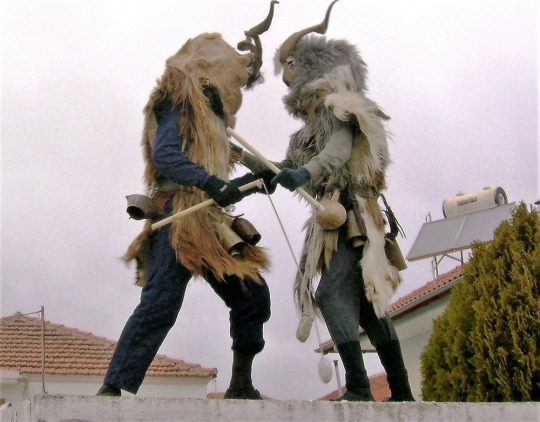
Table of Contents
Philosophy.
The Church as a building and as a center of faith.
Chapels and even smaller churches.
The Communion.
Livanisma / Thimiama – Incense burning.
Home Altars.
Clothing.
Komboskini - The prayer rope.
Tama - Votive
Crosses in high places.
Wedding
Baptism
Wedding & Baptism.
Burial customs and honoring the dead.
Agiasmos - Blessing.
Protomaya.
Martis - The protective bracelet of Spring.
Easter Traditions.
Vasilopita on Christmas
Kalanda
Mount Athos
Pilgrimage to Tinos
The Catching of the Cross
More customs
Random Information
1. Philosophy
Love and Forgiveness are the main pillars of the faith. Some people follow the Bible to the letter, others pick the parts that think reflect our age and most of people keep the general message of the teachings. The Holy Texts are interpreted differently by different people and there can be contradictions in lifestyles and believes. However, the notion that having love and forgiving is what makes you a Christian is widely believed.
Anyone who does not love does not know God, because God is love. - 1 John 4:8
Love is patient, love is kind. It does not envy, it does not boast, it is not proud. It does not dishonor others, it is not self-seeking, it is not easily angered, it keeps no record of wrongs.- 1 Corinthians 13:4-5
There is no fear in love, but perfect love casts out fear. For fear has to do with punishment, and whoever fears has not been perfected in love. - 1 John 4:18
Don’t say ‘I am hated, and that’s why I do not love‘. For this is why you out to love the most. - Ioannis Chrysostomos
“But I say to you who hear, Love your enemies, do good to those who hate you” Luke 6:27
“Do not judge, and you will not be judged. Do not condemn, and you will not be condemned. Forgive, and you will be forgiven.” - Luke 6:37
"Then Peter came to Jesus and asked, 'Lord, how many times shall I forgive my brother or sister who sins against me? Up to seven times?' Jesus answered, 'I tell you, not seven times, but seventy-seven times.' " - Matthew 18:21-22
2. The Church as a building and as a center of faith
Jesus and the Apostles gave us some directions for the worship but most of practices, as well as the architecture of worship came from the Greeks themselves. I jokingly say that Greeks are low key pagans, because religion didn't change the culture. (It did, but only a bit). Christians first worshipped inside the old temples of the Hellenic gods (the Parthenon was once the temple of Virgin Mary) and they built their first churches in that style. The architecture changed with time but it still carries the mark of ancient temples.
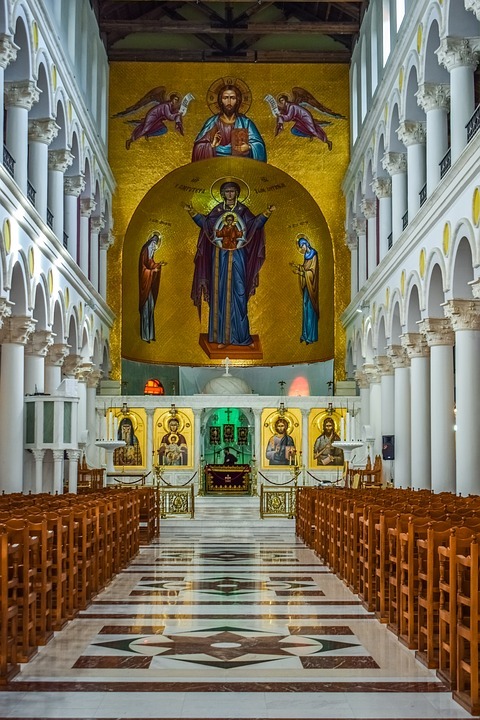
Agios Demetrios Thessalonikis
In this link you can view the different styles of architecture for Greek Orthodox Churches. (Link)
In Orthodox churches you don't have to have a feeling of the dominance of God, like in the Catholic or protestant churches, but a feeling of warmth and belonging. In the hall you can buy a candle to light on a display of candles in the hall, to get a blessing for yourself and the soul of anyone you want. Nobody supervises you there.
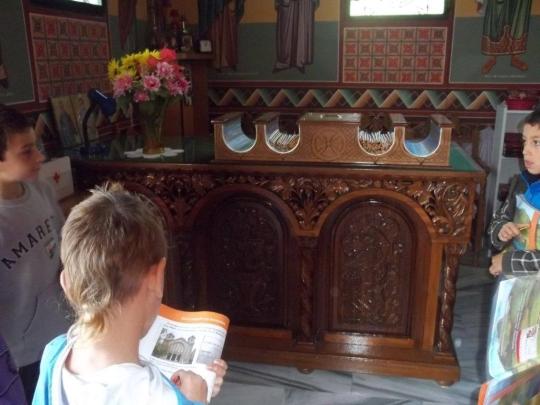

You can also not pay but I haven't seen anyone not giving money, so far. After that you kiss all the icons displayed in the hall and cross yourself.
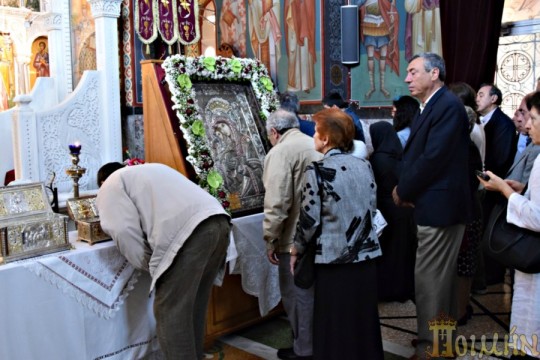
As you enter church, men on the left side, women on the right. There is also a special place for women, an interior balcony which is really cool and women go there if they want to. Nowadays man and women can go there.

3. Chapels and even smaller churches
Chapels serve the same purpose as churches but liturgies rarely happen in them. You can get married in them sometimes.
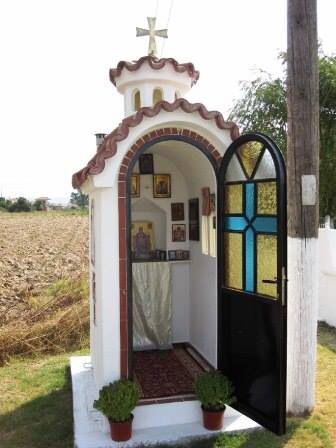
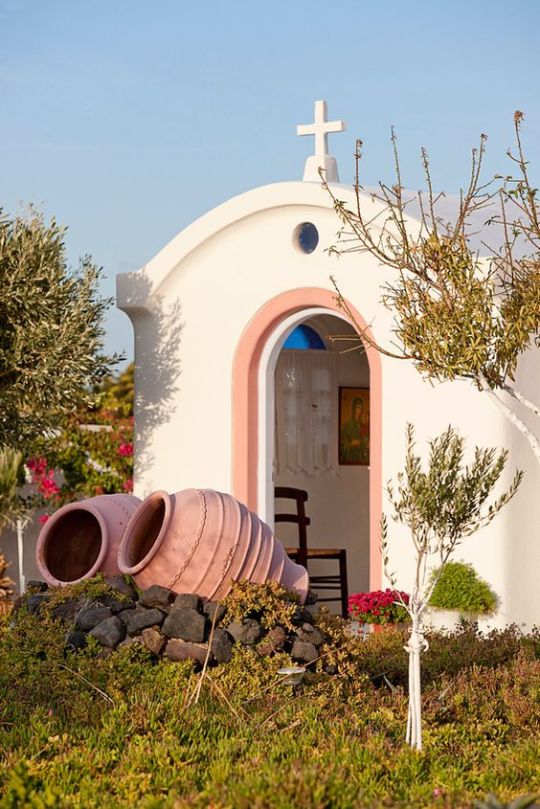
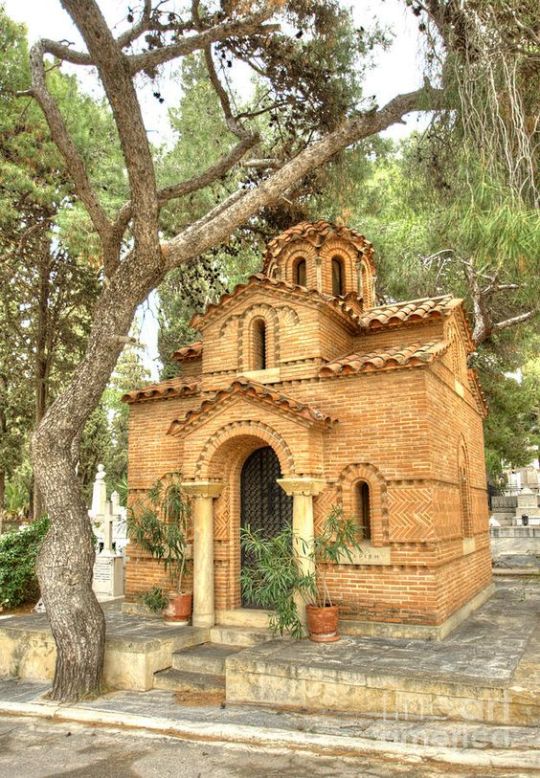
They can be carved in stone or into a cave - even in a tree or in between multiple trees.

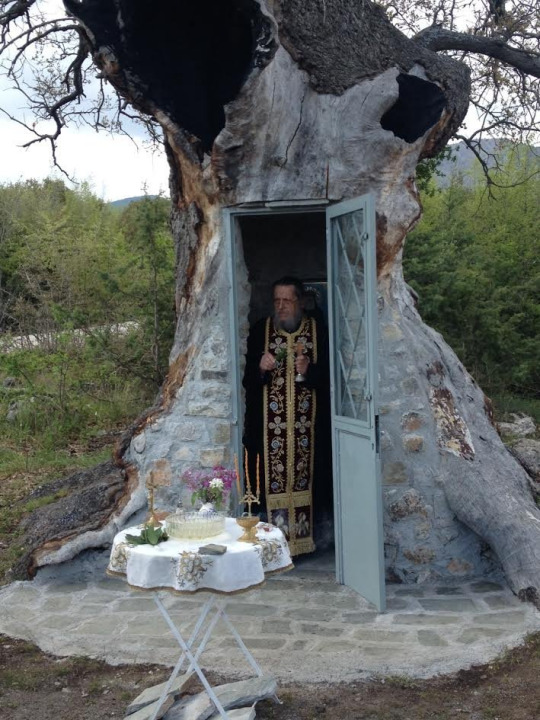

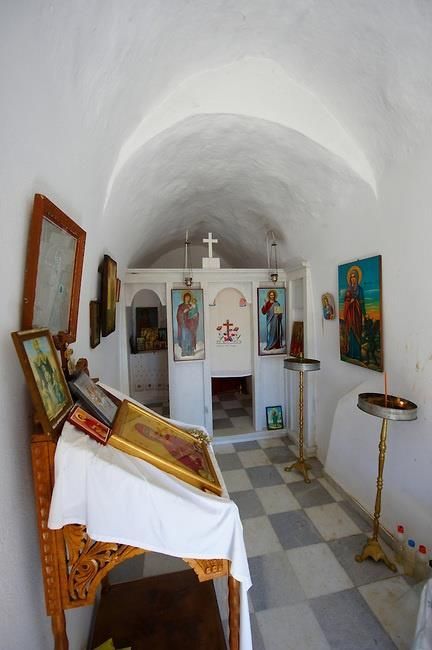
The also exist in big hospitals to bless the patients and invite people to pray for their sick.
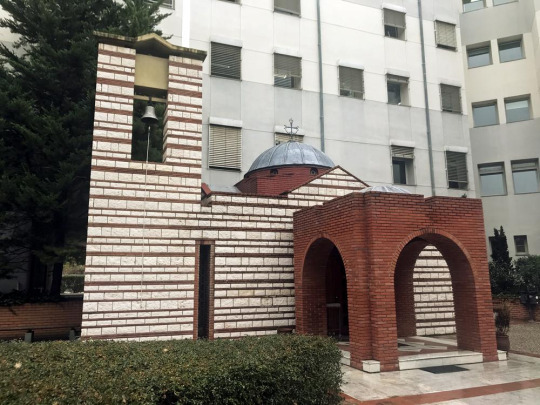
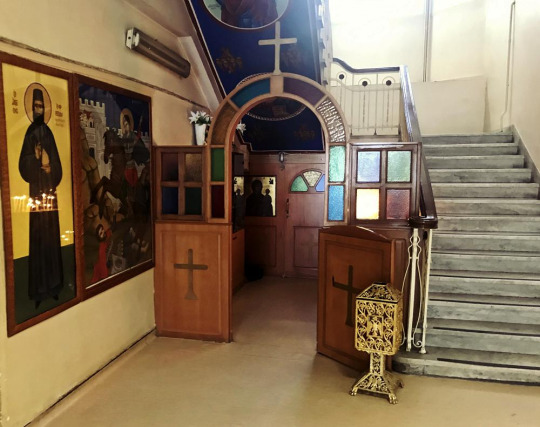
They can be seen in some big hotels, too!
But the churches can become even smaller!
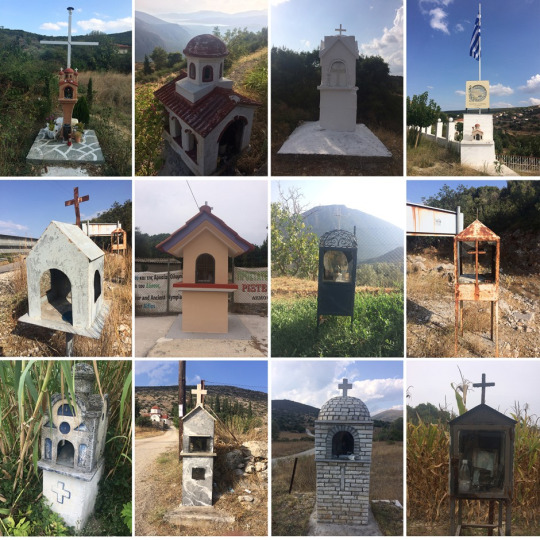
Traveling the roads of Greece you will see dollhouse-sized roadside chapels. Some are elaborate little things made of terracotta or even marble, plonked in the middle of nowhere, high up in the mountains; no village or houses for miles, and yet impossibly, most of them are faithfully maintained with a candle always burning inside.
There’s a number of reasons for these heartfelt shrines, some as old as the roads themselves. Placed by the roadside, an initial assumption is that they’re built to remember a victim of a traffic accident victim, and sometimes this is exactly the case. But just as often, shrines will be built by survivors of accidents, thanking a saint at the location of their ordeal.
They can be found in home yards of people who want to come closer to God
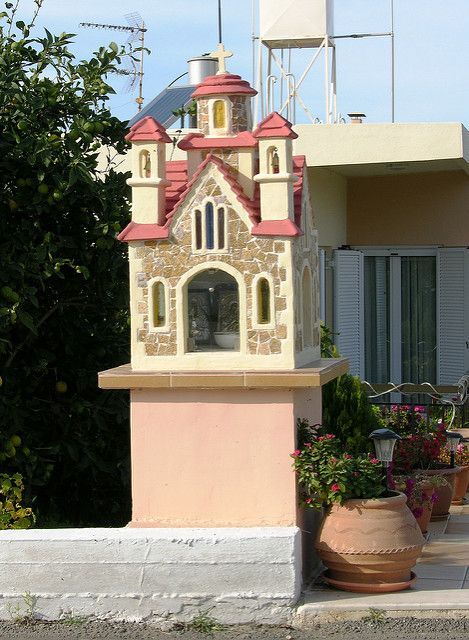
4. The Communion
We all take part in Communion with the same spoon. The Communion has bread crumbs in. Even babies drink a tiny bit of the wine (blood of Christ). Traditionally you were "unpure" if you had your period - others believed the blood of Christ would come out of you as period blood if you drunk it, so generally getting the communion during your period is a no for many.

5. Livanisma / Thimiama – Incense burning

Today, Orthodox Christians use incense throughout the church services. The priest “censes” certain areas at certain parts of the liturgy. The incense is placed inside a device known as a “censor”, which is fairly ornate in appearance and has bells on it so that we not only smell the fragrance, but hear the jingling sound as the priest uses it. This action is meant to remind us that are prayers are rising to the heavens to be heard by God.

Typically in the Orthodox Church, dried incense cones are used. In order to provide the heat needed to allow the cones to burn, a special type of charcoal is used. You also may burn resin, such as Frankincense or Myrrh, directly in an incense burner using charcoal without taking the extra step of mixing it with a binding agent.
Churches often get their incense from special suppliers and maybe even monasteries where the monks or nuns make their own. Typical scents that are used include Frankincense, Myrrh, and Rose.
The believers can also burn incense in their homes and say prayers to ward of Evil.
6. Home Altars
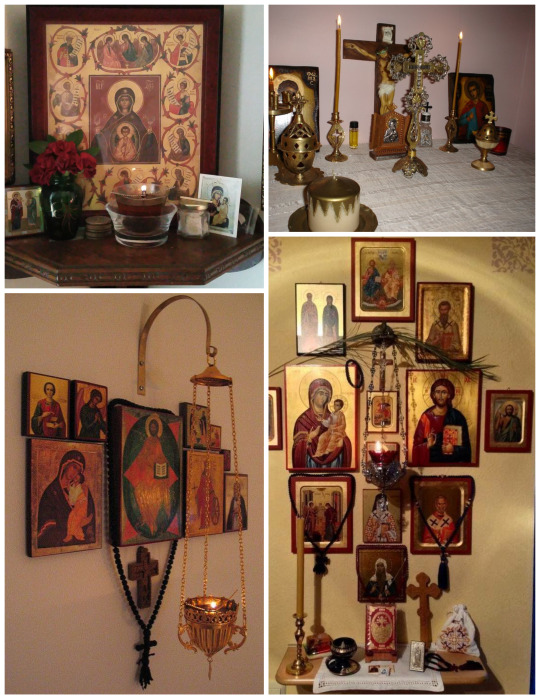
An Orthodox Christian is expected to pray (to be connected with God) constantly. According to Bishop Kallistos Ware, "In Orthodox spirituality, [there is] no separation between liturgy and private devotion." Thus the house, just like the Temple (church building), is considered to be a consecrated place, and the center of worship in the house is the icon corner.
An icon corner is normally oriented to face east. It is often located in a corner to eliminate worldly distractions and allow prayer to be more concentrated. Here is where the icons that the family owns should be located, normally including at least icons of Christ, the Virgin Mary, and the Patron Saint(s) of the family.

An oil lamp normally hangs in front of the icons. The careful trimming of the lamp to keep it burning at all times is interpreted as symbolic of the attentive daily care faithful Christians should take over their souls. Relics of saints (if the family possesses any) and a Gospel Book and a blessing cross would be kept there, as well as incense, holy water, palms and pussywillow from Palm Sunday, candles from Pascha (Easter), and other sacred items, as well as a personal Commemoration Book (containing the names of family and loved ones, both living and departed, to be remembered in prayer).
7. Clothing
People should enter the church in modest attire. No shorts and no short skirts. Women don’t need to cover their head. In fact, almost no woman under 80 covers her head in church.
With special occasions being the exception, Greek Orthodox Priests wear a black himation because of the fall of Constantinople. They wear it all the time, even to grocery shopping. They have long hair and beard. In rare cases you will see women dressed with a long black cloth - something like a burqa but the whole face is uncovered. They are nuns or devoted to Christ.
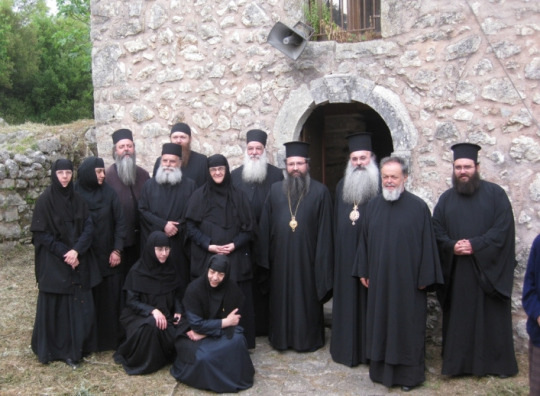
8. Komboskini - The prayer rope

The prayer rope, known in Greek as a κομποσκίνι (komboskini), has long been a powerful weapon for the Orthodox Christian. It has a very simple design, but is filled with meaning. The rope typically comes in one of three lengths, 33 knots, 50 knots, or 100 knots, though there are some in use which are as long as 500 knots. The 33 knots of the shorter rope symbolize the 33 years Christ spent on earth.
It is used in conjunction with the Prayer of the Heart. On each knot is said, "Lord Jesus Christ, Son of God, have mercy on me, a sinner." This prayer is occasionally shortened to, "Lord Jesus Christ, have mercy on me," and other prayers are sometimes said, such as, "God be merciful to me a sinner." Prostrations can also be made with each prayer or after a certain number of prayers. By carrying a prayer rope on us discreetly, we are reminded to “pray without ceasing”.

The prayer rope is attributed to St. Pachomius (4th century). The devil would untie the simple knots he would make to count his prayers. Inspired by a vision from an angel of God, St. Pachomius was able to create a special knot composed of nine interconnected crosses (representing the nine angelic classes), that the devil was unable to untie.
9. Tama - Votive
Tama is a form of votive offering or ex-voto used in the Eastern Orthodox Churches, particularly the Greek Orthodox Church. Tamata are usually small metal plaques, which may be of base or precious metal, usually with an embossed image symbolizing the subject of prayer for which the plaque is offered.

The tradition comes from the ancient years, when Greeks offered metal or marble plaques to the gods, often for the cure of an ailment. Eyes may indicate an eye affliction, hands or legs may indicate maladies of the limbs, a pair of wedding crowns may mean a prayer for a happy marriage, etc.
Tama also means Promise. Usually the believers promise something to a saint in exchange for their help on something. My aunt made a tama to the saint Anastasia Farmakolitra ("saves through medicine") to change her name day from the day of the Resurrection to the day of Anastasia Farmakolitra's day if her daughter passed to Pharmaceutical School. Many promise to light big candles (Lambathes) as an offering to the saint or make a donation to their church. Making a lambatha in your height is a standard tama.
10. Crosses in high places
The Greeks want to feel watched over by the Divine but also leave their mark in the area they live. A way to show their devotion is to place big crosses in hills and mountains which overlook their city, town or village.
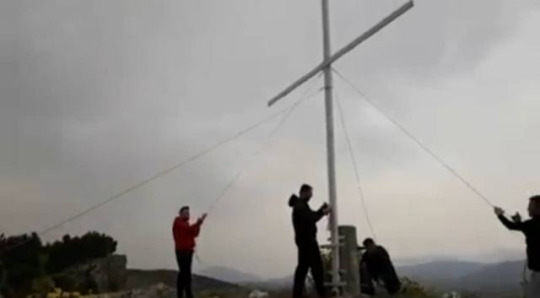
In some cases you find those crosses in high, remote places.

Some crosses light up at night!

11. Wedding
When the priest says "and the woman should fear the man" in a wedding, the bride may step on the groom's foot to show dominance.
In the bride’s shoe sole her unmarried friends write their names. The woman whose name fades first will be the first to marry
The relatives also put money into the shoe of the bride “so it can fit better“ - but really it’s just a gesture to give money to the couple
The Crowning is the highlight and focal point of the Sacrament of Holy matrimony. The priest then takes two wedding crowns (stefana), and blesses the bride and groom in the name of the Father, and the Son, and the Holy Spirit, and then places the crowns upon their heads. The Best Man or Best Woman then interchanges the crowns three times as a witness to the sealing of the union. People keep their stefana in their house and even frame them.
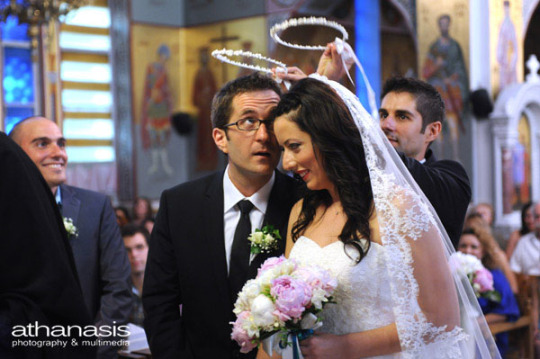
12. Baptism
Greeks take their names from their grandparents (since ancient years) and the name is kept a secret until the baptism.
It is a ceremonial moment because prior to the Christening, the individual is not yet part of the church family. In the church hall the priest asks the person to be christened to renounce Satan. If the individual is an infant, the godparent does it for the child. In the next major part of the ceremony, the person being baptized is immersed in the water three times, which is symbolic of Christ’s birth, death, and resurrection. The person is oiled - so they can be blessed and slip from the hands of Satan - and a tuft from their head is cut - to symbolize new beginnings, devotion to Christ and to give Satan less hair to grab them from. If baptized as an infant, after immersion the child is placed in the arms of the godparent with a white sheet, which symbolizes purity. Then, the child receives the sacrament of Chrismation.
The godparent gifts a golden cross to the baptized and, as long as the baptized is young, they buy them shoes for Christmas and an Easter Candle for Easter.
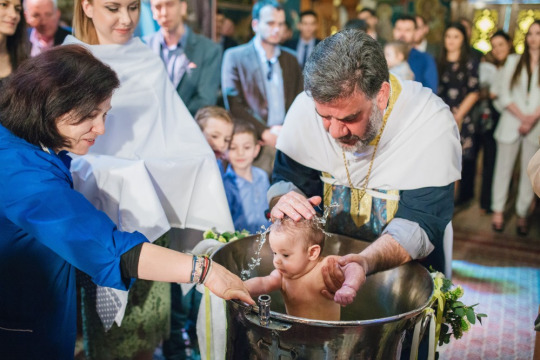
13. Wedding & Baptism
You can do a wedding-baptism to save money. First the marriage, then the baptism. If the child is about to die before a baptism gets arranged - God forbid - they get baptized in the air (and not in water) by a priest.
Koufeta (Sugar Coated Almonds) are mainly served in weddings but also when wedding and baptism happen in the same day. They are placed in little bags in odd numbers and are served on a silver tray. Odd numbers are indivisible, symbolizing how the newlyweds will share everything and remain undivided. Tradition holds that if an unmarried woman puts the almonds under her pillow, she'll dream of her future husband.
After wedding and/or baptism there is - of course - a feast with hundreds of guests.

14. Burial customs and honoring the dead
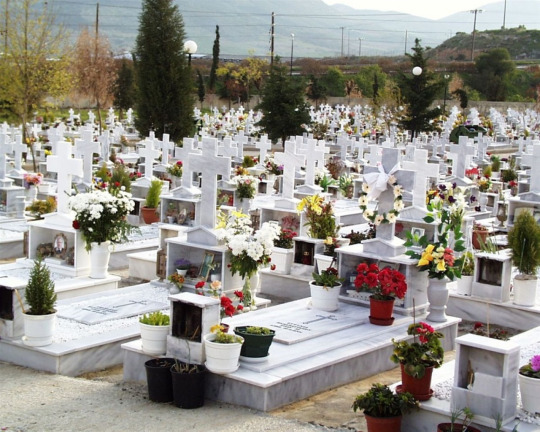
Pouring wine on the graves during the burial, as an offering or to prevent the dead from coming to life. (I am not sure but that is probably wine blessed in the church).
There is a feast after every mystery. Even funerals.There are more feasts for the dead as time passes. You have to do them in 3 days, 9 days and 40 days. You don't have to do all of them but it's showing respect to the dead and most people do them. 3 and 40 days feast are very important. For the 40 days feast - as for the funeral - there are flyers on the area, which invite people. When 1 year and 3 years pass you go to Church and the priest mentions the name of the dead in the blessings and later comes from the grave to chant.
During the Sabbath of Souls you have to bring koliva (wheat) to offer to the dead in the family. Supposedly the dead "feed" from them. So it has to be boiled!
Charon is the one who takes souls in our recent tradition.
Graves stones often have sketched pictures or photos of the deceased on them.
15. Agiasmos - Blessing
The start of the New Year in the tradition of the Orthodox Church is marked with the blessing of homes and businesses with Holy Water, or an Agiasmos (literally, to make blessed). This practice commences immediately following the Feast of the Theophany (the annual celebration and remembrance of the Baptism of Jesus Christ – January 6). This blessing is not something done for good luck or to prevent bad luck, but rather a blessing to help strengthen and protect.
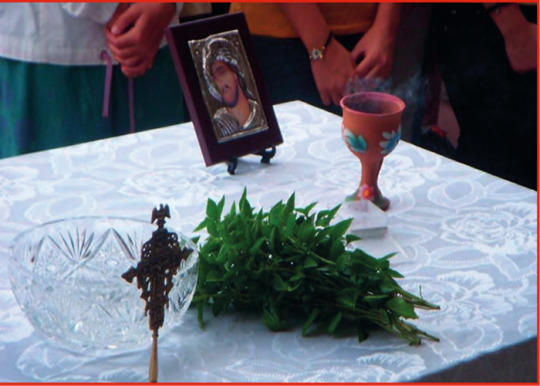
The following items are needed for the ceremony:
Small or medium size bowl, filled halfway with cold tap water
Small twig of fresh basil (floral kind)
Icon displayed behind the bowl
Hand censer, lit and burning incense during the service
The service is also provided in schools when the new school year starts. This is a particular occasion which can be annoying but also fun for the students because... water shower! Please watch this video (Link). I love it because the priest comes too close to the children - sometimes they want to bless too much - and the kids try to avoid getting wet from head to toe!
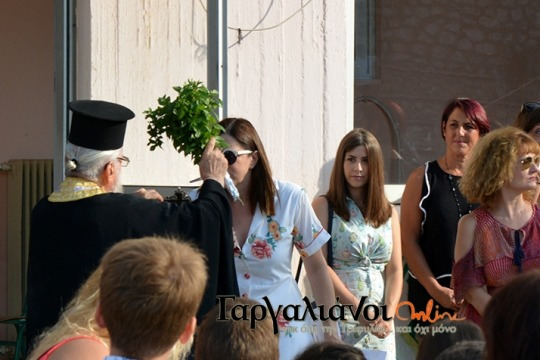
16. Protomaya
May, according to Greek folklore, has two meanings: The good and the bad, rebirth and death. The custom celebrates the final victory of the summer against winter as the victory of the life against death go back at the ancient years and accumulated at the first day of May. This day was also dedicated to the goddess of agriculture Dimitra and her daughter Persephone, who this day emerges from the under world and comes to earth. Her coming to earth from Hades marks the blooming of nature and the birth of summer.
Another ancient celebration that Protomagia has its roots is Anthestiria, a celebration in honor of Dionysos (the Greek God of theater and parties) a festival of souls, plants and flowers, celebrating the rebirth of man and nature.
The custom of May 1st is to decorate the doors of houses with flower wreaths in a way to welcome the power of nature into our home. The wreath is made from various flowers, handpicked and knitted together. In some parts of Asia Minor, people put on each wreath, except flowers, a garlic for the evil eye, a thorn to protect the house from enemies and an ear for good harvest. The wreaths adorn the doors of the houses until the day of St. John the Harvester (June 24) when all the wreaths of the neighborhood are gathered and burnt in a big fire, the fire of the saint.
See my hashtag #protomaya for more
17. Martis - The protective bracelet of Spring

It’s said it’s an ancient tradition dating back to the cults of Demeter and Persephone. Eleusis was the ancient city where the ancients performed secret rites for the cult. As a form of initiation into the cult, which was one of the Eleusinian Mysteries, the faithful wore a bracelet called a “kroki” around both their right hand and left ankle. Amazingly, the ancient tradition still lives on today in modern Greece. However, there are certain rules that one must abide by when creating and wearing the symbolic bracelet which celebrates the arrival of Spring.
Most importantly, the bracelet must be woven on the last day of February and it must be made of white and red thread. The white thread of the bracelet symbolizes purity while the red represents life and passion.
In ancient times, people believed that the bracelet helped protect the person who was wearing it from diseases, as well as the strong rays of the spring sun during the month of March. Today they say it protects from the strong rays but also the cold of March. Since it’s a transitional month you can burn from the sunrays but you also need wood for your fireplace!
Part of the ancient tradition in Greece calls for the person wearing their red and white “Martis” bracelet to take it off and tie it to the first flowering tree they see in March, in order to yield a healthy harvest and to keep the tree healthy.
Another practice with Martis bracelets occurs when the first swallow of the Spring is sighted. The first person who sees a swallow upon the bird’s return from its winter migration, ties their bracelet around the nearest rose bush to encourage the bird to make its nest there.

18. Easter Traditions
Easter is the biggest celebration of the Greek Orthodox tradition. The Holy Week, preceding Easter Sunday, is a time to ponder on Jesus’ Passion and Crucifixion. It is often regarded as an opportunity for body cleansing through fasting, visiting their town of origin and embracing local traditions.
We fast for 40 days (cutting more and more foods every week). Before the fasting we have Tsiknopempti when we eat as much meat as we want, to give our body what it needs before cutting it for 40 days. (It's sort of a celebration and people go out). University restaurants and private restaurants always have fasting options this period. The first day of the fasting is called Clean Monday and it's also like a celebration. It’s the first day we start eating “fasting” food and we also fly kites!
Kyra Sarakosti - Lady Lent

She can be made out of paper or dough. Lady Lent has seven feet. They represent the seven weeks of Lent. Each passing week, on each Saturday, children get to break off one foot. This is a great visual way to countdown the weeks until Easter.
Lady Lent has no mouth. The missing mouth symbolizes fasting. No consumption of meat, dairy products or eggs. She has no ears, this means that she refuses to listen to gossip. Her cross represents the easter religious services in the church, her hands are folded for prayer.
After the last foot is cut off, it is tradition to place this foot in a bowl with fruits and nuts and whoever finds it receives a special blessing.
You don't have to fast if you don't want to. Fasting from bad thoughts and words is equally - if not more important - than food fasting.
Epitaphios threnos (funerary lamentation) is the name of the matins of Holy Saturday, served in Good Friday evening. Within a liturgical context, this is also the name of an icon, usually made of cloth and richly embroidered, depicting the body of Christ being laid in the grave, often by the Virgin Mary and some disciples.
On Good Friday morning, the icon is placed on a platform, resembling a bier, typically topped with an elaborately carved wood canopy. In most cases, the canopy is heavily decorated with ornate flower arrangements, ribbons and sometimes candles. Young girls (the "virgins") have to adorn it with flowers.
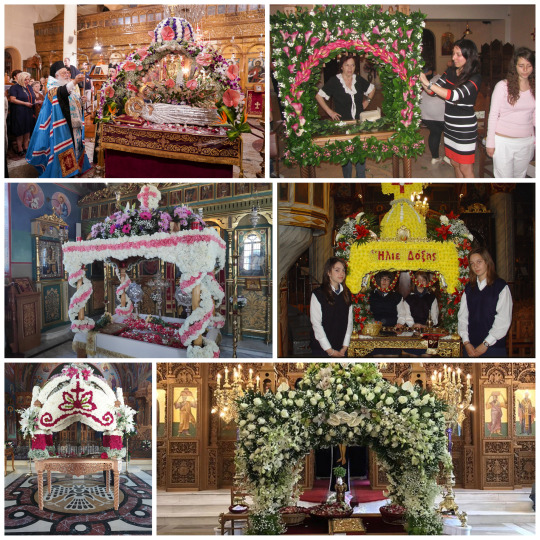
Throughout the day, people can come into the church and venerate it. Kids have to pass under the platform in order to take a blessing.
In the evening the service begins; near the end of the ceremony, the canopied platform bearing the icon is lifted on the shoulders of priests or churchgoers (usually four to six people) and carried through the streets followed by the believers.

In towns with more than one parish, the processions starting from different churches may converge to a single spot (usually the town square), where they temporarily stop and a common hymn is sung before they resume their routes. In large towns, the chants are often performed by a marching band.
The epitaphs in the Central Square of Larissa (Short Video)
These practices have numerous variations according to regional traditions. On the island of Zakynthos in the Ionian, instead of an embroidered cloth, a lamb is used: this is a figure of the dead body of Christ, cut out from board and painted from both sides, placed vertically so that it can be seen from either side of the bier. Another famous custom, the “burning of Judas”, where an effigy of Judas is set aflame on a bonfire, is usually regarded as an Easter Sunday ritual; in some parts of Thrace and Macedonia, however, it takes place on Good Friday, after the procession. In some coastal towns, most notably on the islands of Hydra and Tinos, the men carrying the Epitaphios march right into the sea, until they are at least waist-deep in water, where they may remain for several minutes, often holding the platform high to protect it. During this time, prayers are said for the welfare and safe return of the many seafarers coming from those communities.
Watch footage from the Epitaphios procession in Kaminia, Hydra (Short Video Link)
Τhe flowers used for the adorning of the Epitaphios are considered blessed and women used to put them under their pillow for protection or to dream their future husband, or to put them in talismen for their beloved or use them as medicine, or they put them in the home altar.
On 00:01 on Easter Sunday the priests happily chant "Christ has risen from the dead!" in one of the most known and iconic chants in Greek Orthodoxy. There are fireworks and we kiss each other on the cheek having this exchange: - Christ has risen! - True! This exchange is used by many as a greeting for 40 days after the resurrection. In the Resurrection the priest offers the Holy Light and people go to get it and pass it to their own company or anyone else who asks for it. The candle is held in candles you buy yourself but for children their god parents buy them. With the smoke of this fire you make a cross above your door and you don't clean it up - never. A door can have multiple black crosses above it. With the Holy Light you light up the lamps of your home altar. Some people have breaking eggs contests right after the announcement of the Resurrection, others do them when they come home. We also eat a special soup that night called Magiritsa. It has meat so with this we cut our feast. When the morning comes we host family gatherings and eat as much meat as we want.
19. Vasilopita on Christmas
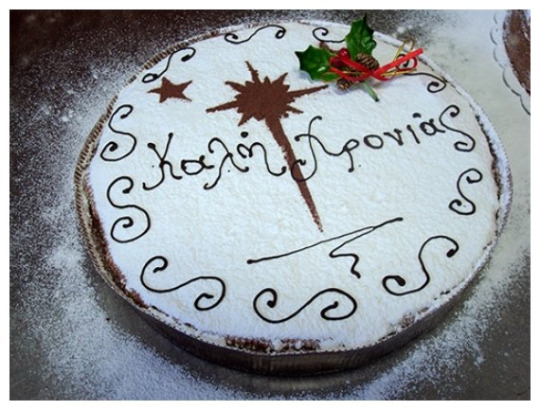
The Greek word Vasilopita is directly translated as “Sweet Bread of Basil”. When the Vasilopita is prepared, a coin is baked into the ingredients. When the observance begins, usually on New Years Day, the bread is traditionally cut by the senior member of the family, and the individual who receives the portion of the Pita which contains the coin is considered Blessed for the New Year.
Vasilopita is also cut in educational institues and the workplace. Whoever finds the coin usually receives a gift.
This age old tradition commenced in the fourth century, when Saint Basil the Great, who was a bishop, wanted to distribute money to the poor in his Diocese. He wanted to preserve their dignity, so as not to look like charity, he commissioned some women to bake sweetened bread, in which he arranged to place gold coins. Thus the families in cutting the bread to nourish themselves, were pleasantly surprised to find the coins.
20. Kalanda

Caroling (kalanda) has roots in ancient Greece. Children would carry small boats and sing songs honoring Dionysius. In Ancient Greece the children would praise the head of the household. At this time in history they would also gift the head of the household with an olive branch, which signified prosperity. Greek Christmas carols date back to the Byzantine times.
After singing for the household, the children receive money (and sometimes sweets). Before the financial crisis one could gather hundreds of euros from Kalanda.
Children say Kalanda on Christmas Eve, on New Years Eve, on Epiphany Even and Lazaros Sabbath. The songs are different for those four occasions.
21. Mount Athos
Mount Athos is a mountain and peninsula in northeastern Greece and an important centre of Eastern Orthodox monasticism. It is governed as an autonomous polity within the Hellenic Republic. Mount Athos is home to 20 monasteries. It’s commonly referred to as Agion Oros (Άγιον Όρος, 'Holy Mountain').
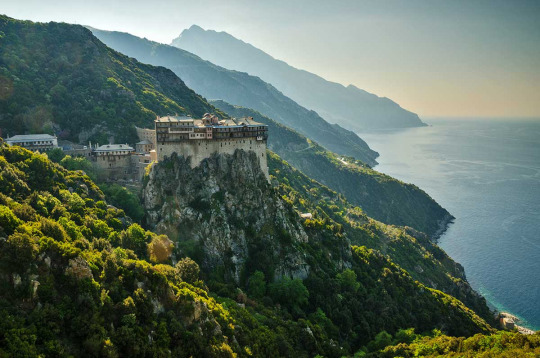
According to the Athonite tradition, the Virgin Mary was sailing accompanied by St John the Evangelist from Joppa to Cyprus to visit Lazarus. When the ship was blown off course to then-pagan Athos, it was forced to anchor near the port of Klement, close to the present monastery of Iviron. The Virgin walked ashore and, overwhelmed by the wonderful and wild natural beauty of the mountain, she blessed it and asked her Son for it to be her garden. From that moment the mountain was consecrated as the garden of the Mother of God and was out of bounds to all other women.
22. Pilgrimage to Tinos

15 August is a national holiday in Greece and sees a mass departure from the cities to the islands and holiday homes in the mainland. However one island in particular witnesses more activity than most; the island of Tinos. Across Tinos are churches and shrines, the most famous of which is Panagia Evangelistria, the most holy church in Greece which houses the ‘Miraculous Icon of Virgin Mary’. In the Greek Orthodox religion, the Icon is considered to be the protector of all of Greece.
In the Orthodox Church the 15th is ‘Virgin Mary Assumption Day’ where the Virgin is believed to have ascended to heaven. The ritual of travelling to pay homage to such a sacred Icon at this time is highly emotional for Pilgrims, with the Holy Icon in Tinos serving as a main passage between the Virgin and the believers who seek comfort and miracles on their trip.

Often pilgrims crawl to the church from the boats that they arrive on on their hands and knees to show their devotion and pray for compassion, good health and healing. The final part of the pilgrimage often happens in the blazing heat which makes the effort even more momentous.
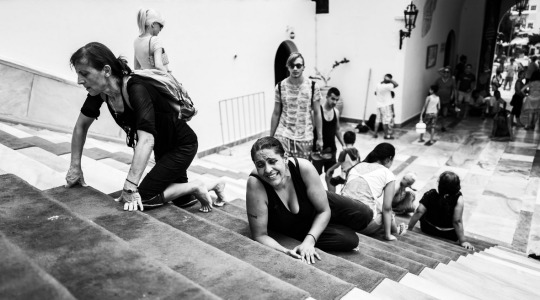
The atmosphere at and around the Church in the days proceeding the event is sincere and intense. Other pilgrims will arrive at Tinos the night before and sleep in front of the Church to ensure they have the opportunity to see and pray to the Holy Icon.
On the day itself the Holy Icon is carried through the streets of Tinos by members of the Greek army and navy, followed by the Greek Orthodox priests, political figures and the public. The procession leads down to the port when the Icon is stationed on a marble podium and speeches are made. The desire of members of the public to touch the icon often leads to a frenetic atmosphere as pilgrims try to touch the Icon itself. After the procession and speeches the Holy Icon is returned to the Church.
__________________________________________
In the same day Epitaphs of the Virgin Mary are honored and are taken to the streets so everyone can pay their respects.
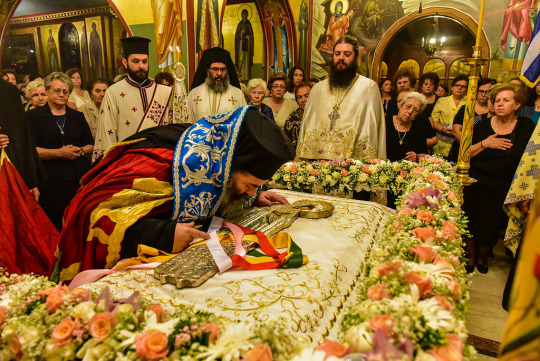
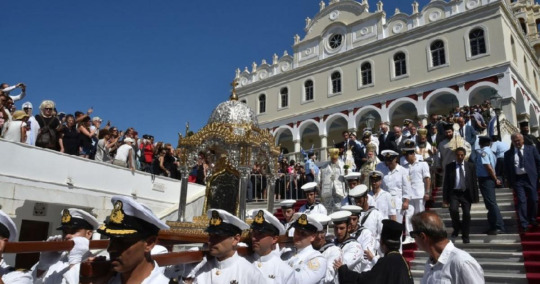
23. The Catching of the Cross
On the sixth of January, the Christmas holidays in Greece officially come to an end with the ‘festival of light’ (‘ton foton’ in Greek), also known as Epiphany.
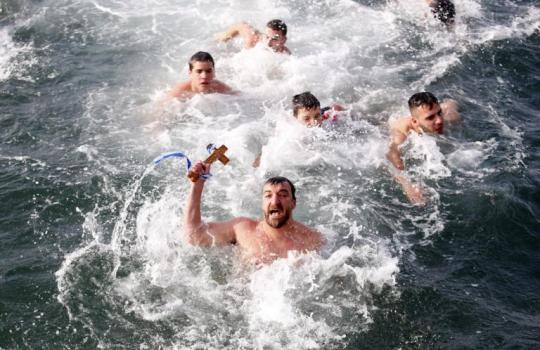
In the Greek Orthodox Church, Epiphany is celebrated as the revelation of Christ as the messiah and second person of the trinity, at his baptism, by John the Baptist, in the River Jordan.
Another cause for celebration in the Greek Orthodox Church on this day is that Christ’s baptism was only one of two occasions when all three persons of the trinity revealed themselves, at the same time, to humanity:
God the Father, speaking from the clouds, God the Son, being baptized in the River Jordan, and God the Holy Spirit, revealed as a dove, descending from heaven.
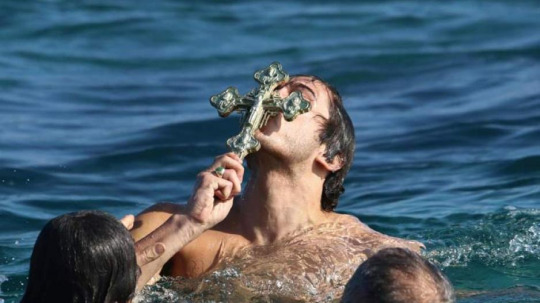
On Epiphany, the Greek Orthodox Church performs
the ‘Great Blessing of the Waters’.
This ceremony is usually performed twice, once on the eve of Epiphany which is performed in the church, and then again on the actual day outdoors with priests blessing large bodies of water, sea, rivers, lakes etc.
The tradition is that
a priest, surrounded by brave young men and boys, throws a cross into the sea, either from the harbour or from a boat at sea; the minute the cross leaves the priest’s hand, the divers jump into the freezing water to catch the cross. The lucky one who finds and returns the cross is blessed by the priest. As the cross is victoriously brought back, the priest releases a white dove, as a symbol of the holy spirit.
This tradition is carried out to commemorate the baptism of Christ and to bless the waters.
24. More customs
Each city, town and village is protected by a different saint. When the saint of the area celebrates a fair is organized. There is music, dance and stalls where the peddlers sell their merchandise.

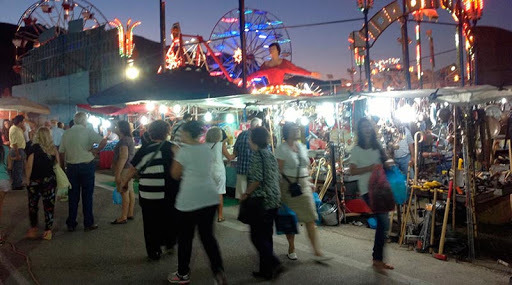
But Greeks know that some of their customs are not approved by the church. We do it anyways and sometimes the priests join, too!
Το celebrate the Epiphany and chase away the evil spirits some residents dress up in scary attire and make a lot of noise with their voice and bells. They drink excessively, they dance and even fight with each other “to the death“ (it’s fake, don’t worry!). This custom exists in many areas of Greece, from Thrace to Cyprus. Even though the people who dress up have many names - momogeroi, babougera, ragoutsia etc - they all symbolize the carefree spirit, childish fun and trickery. Don’t get in their way because they will chase you though the village!

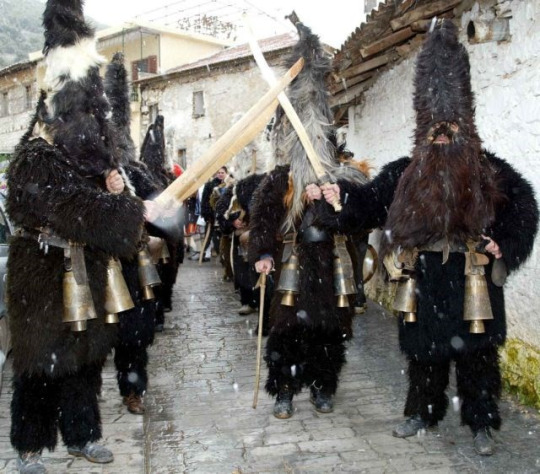
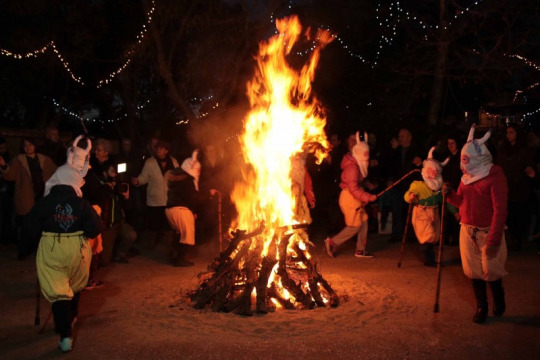
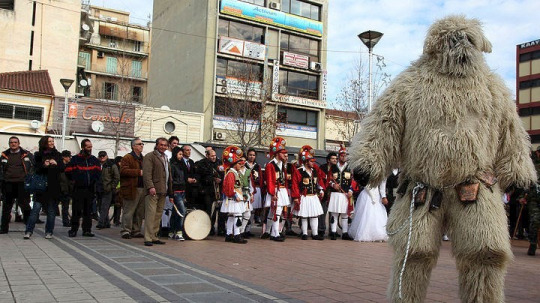
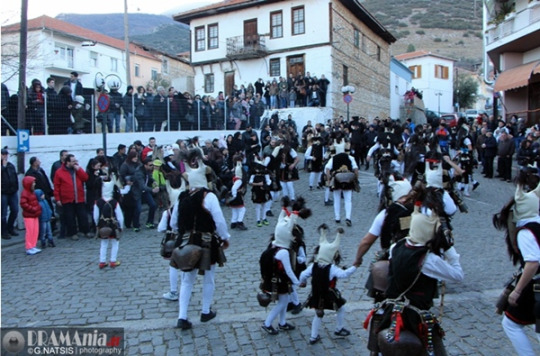


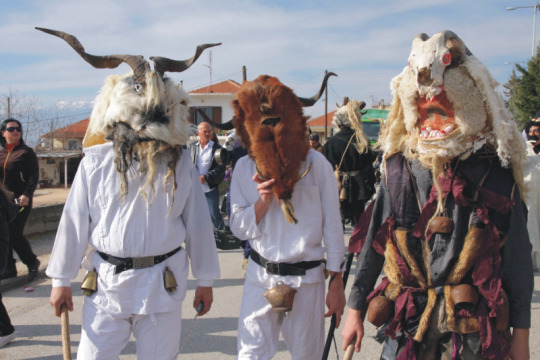

In these festivals there are different characters like the bride, the devil, the cop etc, who can symbolize fertility, the New Year, the Old Year and other concepts.
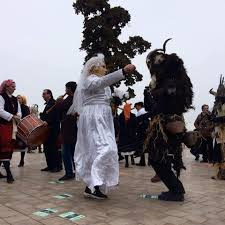

Sometimes the bride (usually played by a man) is abducted and it’s said to be a remnant of a re-enactment of the abduction of the goddess Persephone by Hades.
In other areas the Dionysiac character of the festival is eccentuated by the presence of a man who pretends ot be the god of wine, vegetation, happiness, Dionysos.

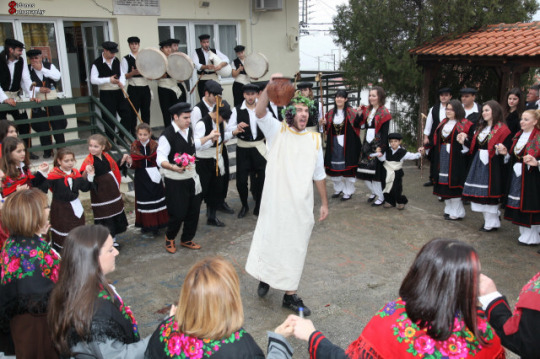
In some areas there is also dancing around a gaitanaki!
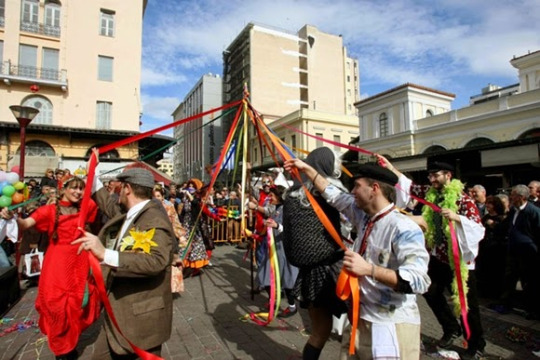
In some areas a fake camel (three people under a cloth) is presented on the streets. It probably started as a spectacle for kids but in some cases today it’s a symbol of resilience and patience. It can also remind us of the magi who rode camels to visit baby Jesus.
There is also the story where a Greek woman is abducted by a Turk and three young men pretend to be a camel to enter the Turk’s wedding with her and steal her back! (Something like the Trojan Horse!)

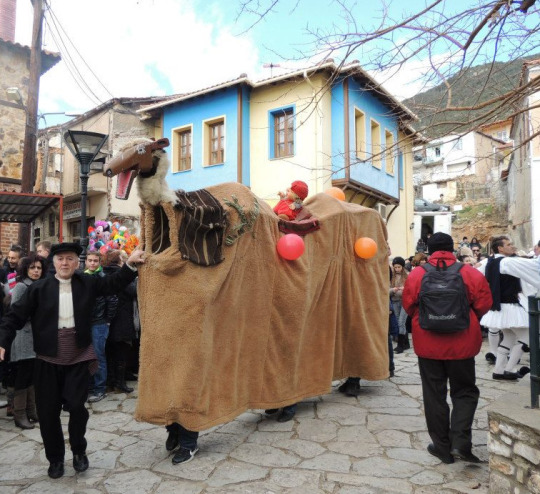
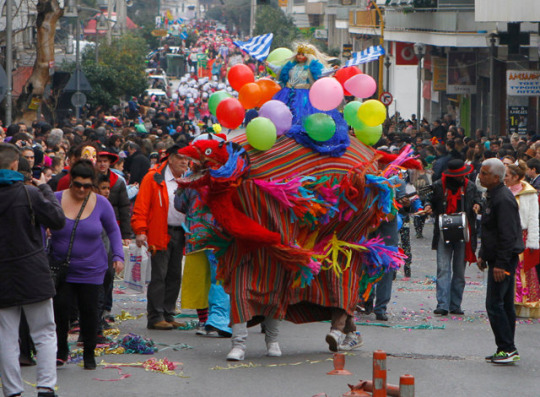
25. Random Information
Namedays are the days when the saint who has your name died. It's said that you actually take your name from them - even if it comes from your grandparents the saint is the reason you have it. In that day you bring treats to your school or work, or you treat your friends to drinks or coffee. People give you wishes ("enjoy your name" is the most common) and they call you on the phone to wish if they are away. The most common name in Greece is Maria and in Maria’s nameday everybody has to call half of their relatives and friends to wish. It’s a bit offensive if someone doesn’t remember your nameday or if they don’t call.
We bring food to the workplace in happy events - like when your child was accepted into a university.
Lots of people cross themselves when they pass outside a church. They could be passing on foot, on the bus, or even when they drive a motorcycle.
You also cross yourself when you call god for protection or when you hear something strange (accompanied with "come Christ and Virgin Mary!")
Making embroidery with the face of Jesus and/or Virgin Mary is a thing.
40 days after the pregnancy women and their newborns can woman can go out of the house but they have to go to Church to be blessed by a priest first.
We say "Christ!" when a person is chocked and "Small healths!" when someone is sneezing. When a baby is yawning bad spirits could come in so we cross their mouth. We also give them eye bendants so the Evil Eye won't get to them. People spit (just saying "ftou ftou ftou") the child after saying good words for them so they can protect them from others who will flatter them with malice. The Evil Eye is recognised by the Church. See more in my #mati tag.
Bell ringing every day before the morning and evening liturgy. It also chimes every hour. On Good Friday it rings solemnly all day.
Priests are considered spiritual leaders by many in the sense they can listen to you and guide you like a psychologist. "My spiritual" people call them.
You don't have to have your mind unguarded, that's why Greek orthodoxy is against yoga which teaches the emptying of mind
Mondays and Wednesdays of all year are for fasting - just meaning you don't eat meat. Some people also fast sexually on those days.
Hatzis- (from middle eastern "hajj") is for people visiting the holy land (Israel) on pilgrimage.
The icons of saints you buy have to be blessed by the Church before you hang them, so they can offer you a connection to the divine.
Every day at school children gather in the yard and one child says the Lord’s Prayer
We don't know the hymns by heart. They are too many and long. But there are books you can read and older people (usually women) usually study them.
All the saints in hagiographies look kinda malnourished because they are supposed to avoid the earthly pleasures.
We give epithets to the saints according to their characteristics - like we did with our ancient gods.
Lots of saints probably “covered” the dominions of older deities because Greeks were used to having smaller powerful entities for different stuff (there is even a saint who helps you find stuff if you dedicate a pie to the church)
We have a set of explanations for dreams (Ονειροκρίτης). For example, if you see something very good in your sleep about a person, misfortune will find them. If you see them dying, they will live for many years.
We read the future in the bottom of the cup of Greek coffee.
From the Byzantine era and today people buy holy wood - from the cross of Christ they say - and bones of saints. In the old time those were also used for witchcraft.If you are born on a Saturday you don't see creatures or ghosts. Also people born on Saturday are lucky and whatever they wish comes true.
Dick festivals are a thing in some areas and they mostly happen on Greek Carnival. Traditional sex songs with dances are also a thing.
Virgin Mary is the mother of Greece, and you see her as a mermaid even. We are pretty chill with our divine figures - we use them in swearing a lot, too.
Many people cross themselves before and after eating.
We take oil blessed from the Church and we put it in the lamps of our home altars. We also anoint people who want to keep safe with it. (My grandma made a cross in my forehead, for example). Many take it home the myrrh produced by the bodies of saints.
We place a bone of a saint on the ground where a church is going to be built.
Sometimes we call a priest to bless our new vehicle!
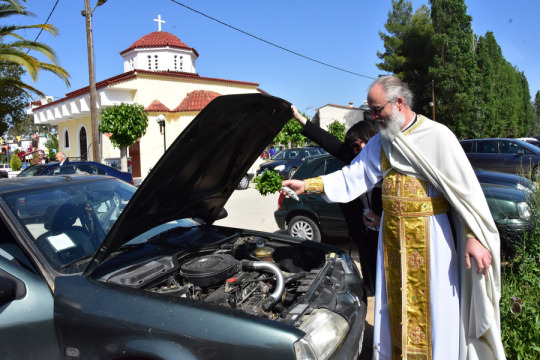

Also, it’s not a very safe practice but a lot of people hand crosses and icons from their front mirror.
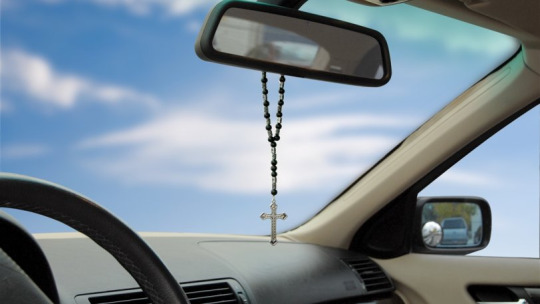
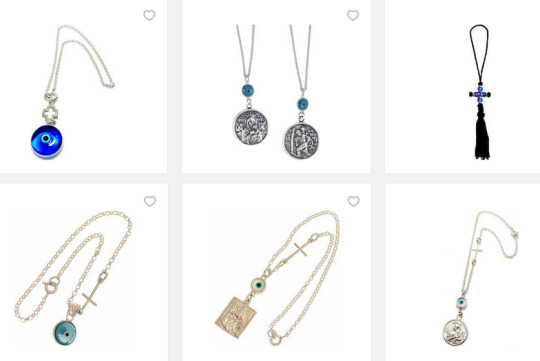
Notice that the #mati is also there!
35 notes
·
View notes
Text
HOMILY for 4th Sunday after Easter (Dominican rite)
James 1:17-21; John 16:5-14
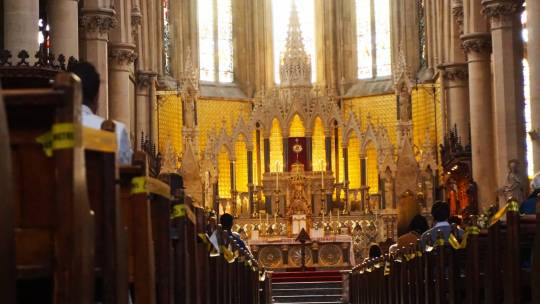
In today’s Gospel the Lord says to his disciples, why have none of you asked me, quo vadis, where are you going? Perhaps they are overcome by sorrow, or they just did not dare to ask him. But as we heard in last Sunday’s Gospel, our sorrow in this life now is only temporary and passing, for “in a little while”, our Christian hope is that we shall, by grace, see Christ again, enjoying the beatific vision in heaven. So, as the Lord said just a few verses before, he goes “to prepare a place for you” (Jn 14:2), in his Father’s house, that is to say, in heaven. And so last Sunday we considered the three-fold joy of the Saints in heaven, a joy which is to be ours if we remain united to Christ.
However, lest we think that heaven is the universal destination of all human beings; or the well-deserved home of all Christians irrespective of how they’ve lived their baptismal calling; or that heaven is simply that “better place” which awaits all people after death, it is probably vital to realise that although the disciples do not ask the Lord where he is going, the Lord Jesus does ask this of his disciples. Quo vadis? This is the question that Our Lord put to St Peter when he appeared to him after his Ascension into heaven, and the prince of the apostles was on the road out of Rome, trying to avoid his martyrdom in that city. He is trying to flee from his Christian vocation; running for his life. So the Lord comes to him and says to him “Where are you going?” For it is possible to, then, to walk away from our heavenly homeland; to choose a path that takes us further from Christ; to try to avoid the Cross and so to end up in another place, the worst place where all who reject the graces of God are, ie, in hell.
Hence the apostle, ashamed and returning to his better self, returned also to Rome and so went to a martyr’s death like Christ’s. St Peter thus entered into heavenly glory with his Christ, entering into his Master’s joy. For as Our Lord said: “He who loves his life loses it, and he who hates his life in this world will keep it for eternal life.” (Jn 12:25)
So the question that is put to us today, and which we must ask ourselves whenever we examine our consciences is, quo vado? Where am I going? And yes, this is posed in the first person because we are often very interested in where others are going, but the Scriptures remind us to be mindful of our own walk with Christ. So the Lord says to St Peter at the end of St John’s Gospel: “What is that to you? Follow me!” (Jn 21:22) Hence St Paul said: “Work out your own salvation with fear and trembling”. (Phil 2:12)
The focus of this church, as I mentioned last Sunday, makes it very clear where we should be going; where we are called by reason of our Christian vocation. We have before us a vision of heaven, and this is made especially evident when the Blessed Sacrament is exposed for Adoration on the Throne, and then the Dominican friars in their white habits are singing the psalms during Vespers, as it happens before this Mass. For the whole apse of this church is designed to show us what, according to the vision of St John, heaven will look like: the Lamb of God seated on the Throne; the white robed army of his followers singing the glory of God as incense goes up; a whole company of heaven looking on, thus the colourful stained glass windows showing the Saints and Angels in heaven. And then, the many pinnacles and niches and gables around the Altar evoking the many rooms in the Father’s house, and the golden walls that remind us that the heavenly Jerusalem is seen to be like pure gold. So, we have before us a vision of heaven, of our destination, and of the joys that await us in union with Mary, our exalted Queen and Mother. So, my brothers and sisters in Christ: Where are you going? To heaven, we hope!
Hence the Lord, having revealed to us the joys of heaven last week, and having told us that we shall have to endure sorrows in this life for a little while, meaning, for our lifetime, he now reveals to us the very necessary help God gives us so that we can live this life well, as faithful Christians, as steadfast pilgrims who are heading always forward towards our heavenly destination. So Jesus says: “If I go, I will send him [the Holy Spirit] to you. And when he comes, he will convince the world concerning sin and righteousness and judgement… When the Spirit of truth comes, he will guide you into all the truth”. (Jn 16:7-8, 13)
Yes, Lord, give us now your Spirit of truth! For with purifying truth, the Holy Spirit will convince us of sin – not the sin of others, which we are quick to see and point out, but the sin that is hidden, the sins that we are too ashamed to admit to ourselves, the sins that we do not want to see but need to bring before God’s mercy if we’re to be saved. These hidden sins the Holy Spirit will bring to light so that we can be healed of them, so that we can have true repentance.
Then, having rejected our sins, the Holy Spirit will come with clarifying truth to convince us of righteousness, that is to say, he will teach us to desire virtue, and to seek the wisdom of God’s ways over the wisdom of the world. As we are observing the Year of St Joseph and yesterday was his feast day, let us look to his example to show us the wisdom of God’s ways. Pope Francis, for example, points out that “as we read the infancy narratives, we may often wonder why God did not act in a more direct and clear way. Yet God acts through events and people. Joseph was the man chosen by God to guide the beginnings of the history of redemption. He was the true “miracle” by which God saves the child and his mother. God acted by trusting in Joseph’s creative courage… A superficial reading of these stories can often give the impression that the world is at the mercy of the strong and mighty, but the “good news” of the Gospel consists in showing that, for all the arrogance and violence of worldly powers, God always finds a way to carry out his saving plan. So too, our lives may at times seem to be at the mercy of the powerful, but the Gospel shows us what counts. God always finds a way to save us, provided we show the same creative courage as the carpenter of Nazareth, who was able to turn a problem into a possibility by trusting always in divine providence.” (Patris Corde, 5)
And thirdly, having given us the Holy Spirit and his gifts and virtues to lead us, we shall be led by the Spirit of truth to judgement. To be convinced of God’s judgement is to know that we shall be called to account for what we have done with our human freedom, and to account for how we have benefited from the gifts and graces that God has given us. Thus each day we are being asked by the Holy Spirit: Quo vado, where are you going? Am I growing in charity, for as St John of the Cross says: “In the evening of life, we will be judged on love alone.” Therefore St Paul reminds us: “Why do you pass judgement on your brother? Or you, why do you despise your brother? For we shall all stand before the judgement seat of God… So each of us shall give account of himself to God.” (Rom 14:10, 12)
Many medieval churches used to have an image of divine judgement painted above the Altar to constantly remind us of this post-mortem necessity. But the question we’re asked is: Where are you going? To which the answer is not merely that we go to be judged on love alone, but rather, we go Him who is Love. The vision of heaven, therefore, which is the vision of our communion with God who is Love alone, is surely the end for which we long, and for which we hope, and by which our actions are motivated. For only Love can motivate us to love. Nevertheless it is noteworthy that in the Sistine Chapel with its monumental painting of the Last Judgement, the mouth of hell is painted directly behind the Cross on the Altar. For it is the Cross of Christ, his holy Sacrifice, his saving Love and Mercy, that has barred Man’s entry into hell.
Hence, when St Peter tried to avoid the Cross of his martyrdom and was running away, the Lord appeared to him to gently turn him around. For we too must go to the Cross; we too must be led by the Spirit of truth to follow our Crucified Lord. For in this way we remain faithful to our Christian vocation. So Jesus said: “If any man would come after me, let him deny himself and take up his cross daily and follow me. For whoever would save his life will lose it; and whoever loses his life for my sake, he will save it.” (Lk 9:23-24) Indeed, the Cross bars our entry to hell, for through it we shall be raised up with the Lord into the joys of heaven. May Our Lady, Queen of Heaven, pray for us!
3 notes
·
View notes
Photo

Ye stiffnecked and uncircumcised in heart and ears, ye do always resist the Holy Ghost: as your fathers did, so do ye. Which of the prophets have not your fathers persecuted? and they have slain them which shewed before of the coming of the Just One; of whom ye have been now the betrayers and murderers: Who have received the law by the disposition of angels, and have not kept it. - Acts 7:51-53 KJV
In this Bible passage, Stephen - one of the original deacons - is speaking to the Jewish people reminding them of all that God had done for them from the time of Abraham: How God gave Moses His Law, how they continued to fall away and wouldn't listen to the prophets, ignoring their warnings and even killing them. He compared them to their ancestors for crucifying Jesus Christ.
So, my question is, are we any different? We, who have seen the saving power of Jesus, we who claim that He is our LORD and Savior and have been baptized into Him, still sin, still fail to love our enemies, still harbor hate in our hearts. Are we any different?
We have even been known to kill the prophets who have come among us such as Martin Luther King, Jr. Why do we keep repeating the sins of the past? Why do we fail in our ability to love? Human beings can be very stiff-necked!
If we work together to live as Jesus wants us to, following Him and His Word, doing His will and learning to love better, we may regain the ability for others to recognize Christians by their love for one another. May the LORD our God help us to do better beginning in this Easter season to make our world a more loving place. What a wonderful God we serve! His will be done!
Thanks and glory be to God! Blessed be the name of the LORD! Hallelujah and Amen!
1 note
·
View note
Text
Chapter 14 “The Miracle of Easter, Psalm 139
4/3/2021
Psalm 139: 13-16 (NKJV)
“For You formed my inward parts; You covered me in my mother’s womb. I will praise You, for I am fearfully and wonderfully made; marvelous are Your works, and that my soul knows very well.
My frame was not hidden from You, when I was made in secret, and skillfully wrought in the lowest parts of the earth. Your eyes saw my substance, being yet unformed. And in Your book they all were written, the days fashioned for me, when as yet there were none of them.”
I honestly don’t remember exactly where, when or how I stumbled onto this psalm. It was sometime in the last couple weeks, and I remember being immediately captivated by David’s poetry of God’s perfect knowledge of mankind. Just a few verses before the passage I quoted above, David asks his creator where he can flee that God will not find him? Whether heaven or hell or the highest mountain or the uttermost parts of the sea, David marvels that God will always find him and be with him, no matter what. (This brought to mind that children’s book where a small child asks his mother if she will still be able to find him no matter what animal he becomes and where he hides. The mother answers that she will always find and love her precious son, no matter what.)
Then I read the four verses that I quoted above, and I had to stop short. I read them again and again, soaking in the words that were at once familiar and suddenly brand new. Somewhere in my early childhood I had memorized verses 13 and 14. Now, pairing them with verses 15 and 16 I was struck by David’s message, especially in verse 16. In the KJV translation, that verse reads, “Thine eyes did see my substance, yet being unperfect; and in Thy book all my members were written, which in continuance were fashioned, when as yet there was none of them.” This verse was new to me, but I had a pretty good idea of what David was saying. But, to get a better idea, I reached for my MacArthur study Bible which is published in the NKJV translation. As soon as I read verse 16 there, I smiled to myself. Yes, I was right.
For the last two weeks I have not been able to get this verse out of my head. God knew me before I was even conceived. He had numbered all my days, had written my whole life from beginning to end, before I was even born. I have been trying to wrap my puny, finite mind around this inconceivable, quantum-sized yet massively cosmological concept. How does a being that exists outside our known space and time, a being that has always been and always shall be, a being that knows my entire life’s story before it’s even begun, a being more vast and omnipresent than the universe He created, have any interest at all in the comparatively insignificant, finite, puny beings that He created but who then immediately disobeyed and rejected Him?
God could have started over. He had no obligation to Adam and Eve whatsoever. He could have wiped them from existence with a single, spoken word. And, in fact, a millennium or so later, He did wipe out all of the human race and started over with just Noah and his family. And even then, mankind has still behaved towards God with great rebellion and sin. In my own life, I declared a long time ago that God didn’t exist. I even said at one point to myself, in the deepest dark of my teenage despair that I hated God. I hated Him for the way He had made me.
And yet, according to Psalm 139:16, God knew every word, every action, every rebellious thought that I would hurl at Him before I was even born. He also knew the day I would raise my eyes to the night sky behind the neon streetlamps six months ago and whisper a sinner’s prayer of forgiveness and surrender. He knows the exact time and day of my death or if I’ll still be alive the day that His son returns in the clouds to rapture the believers home. He knows my every choice, my every thought, my every deed before I make any of them, and He has always kept me wrapped in His arms my whole life, patiently waiting until I was finally ready to wholly and completely surrender to Him.
I have been trying to understand not only the very existence and nature of God, but, more importantly, the depth and power of that kind of love. I have failed at both counts. Instead, I have only been able to quote verse 14 over and over. “I will praise You, for I am fearfully and wonderfully made; marvelous are Your works, and that my soul knows very well.” My soul understands what my frail, limited mind cannot: that God, my Lord and Creator, my Great Savior, loves me in spite of my sin nature; in spite of all I have said and done against him; in spite of all my failures, both past and future.
He loved me enough to provide a way for my salvation.
Tomorrow is Easter Sunday. It’s the day we who believe in God and what His son did for us on the cross celebrate Jesus’ resurrection and His victory over death. This is a Bible story that I have known my whole life. I have sat through countless sermons and Sunday School lessons and family devotionals, and I have listened to my parents, my teachers, and my pastor expound on the greatest truth found in God’s Holy Word. This is the foundation of our faith, the only reason and sole hope of our frail, finite human existence. I know the timeline, the major events starting with the last supper, to the Christ’s anguished, desperate prayer to His heavenly father in the Garden of Gethsemane, to the moment of death and the earthquake that tore the temple veil in two. I know that Peter denied his Lord three times, that the trial was a mockery, that Christ knew that Judas would betray Him, and that Pontius Pilate washed his hands of the matter after his wife told him she suffered a restless night of strange dreams about this particular Jewish rabbi.
I know about the crown of thorns, the beatings, the piercing of His side, the blood and vinegar that flowed from the wound, the nails that were driven into his hands and feet, the excruciating pain and extreme suffering that he endured while hanging there for many hours. I also know about the two thieves – one who acknowledged the lordship of Christ, and the other who stubbornly refused to believe in spite of the evidence right before his own eyes. I know that Christ finally gave up the ghost by raising His weary, bloodied head to the darkened sky and crying, “It is finished!”
I know that He was laid in the tomb after being wrapped carefully and reverently by his followers as they wept with great sorrow and grief. I know that on the morning of the third day, when Mary and Martha came to the tomb, and when they found the stone rolled away and Jesus’ body gone, that they were both afraid and thoroughly confused. I also know that the angel of the Lord asked them, “Why seek ye the living among the dead? He is not here, for he is risen as he promised! Go, and tell his disciples the good news!” And so they did.
I have known that story my whole life, every gory and heartbreaking detail. I have memorized many verses from the four gospels that speak of that great story. But, until this year, I have never known it in my heart and soul.
The God that David speaks of in Psalm 139 has known all my comings and goings, all of my thoughts and words, all my choices and heartbreaks, all my joys and accomplishments, all my times of deepest sorrows and despairs, before I was even conceived in my mother’s womb. He knows me from the very molecules of the protein strands of my DNA to every spiritual corner of my soul. His fingerprints are stamped into my genetic code, and He has loved me always.
I cannot fathom this, and my heart breaks as I contemplate the act of sacrifice that His son made on that cross on Golgotha’s Hill two millennia ago. Just writing those paragraphs describing the story of His death and resurrection has caused me to weep for what I did to send Him there. He bore the sin of ALL mankind – past, present and future – on that cross. That glorious, wonderous, terrible cross. He died for you, and He died for me.
Three months ago I started to expand my Apple music library with new albums and songs by current Christian singers and songwriters. One of them, Chris Tomlin, has a song called “The Wonderful Cross”. It’s his own arrangement of the hymn by Isaac Watts titled “When I Survey The Wonderous Cross.” I have been playing this song over and over during my daily commutes to work for the last few weeks.
When I survey the wonderous cross/On which the prince of glory died/My richest gain I count but loss/And pour contempt on all my pride
See from His head, His hands, His feet/Sorrow and love flow mingled down/Did e’er such love and sorrow meet/Or thorns compose so rich a crown
And now Chris’ own chorus:
Oh the wonderful cross/Oh the wonderful cross/Bids me come and die and find that I may truly live/Oh the wonderful cross/Oh the wonderful cross/All who gather here by grace draw near and bless Your name
This verse by Watts is what gets me every time:
Were the whole realm of nature mine/That were an offering far too small/Love so amazing, so divine/Demands my soul, my life, my all
I come before you, O Lord God, a sinner saved by grace. I recognize that I am not worthy of Your love, Your mercy, or Your forgiveness. But You loved me so greatly and so deeply that You sent Your only son to be born of a virgin, to live as one of us, and then to die by our filthy, vile hands so that we could all be washed beneath His pure blood. By this, you gave us a way to salvation, and all that I have to do is accept this gift by praying and believing in Your name. There is nothing that I could ever do on my own to attain this, and I promise you, O God, that for as long as I live, as long as You give me the ability to draw breath, that I will give You nothing less than my soul, my life, and my all.
Amen.
4 notes
·
View notes
Photo
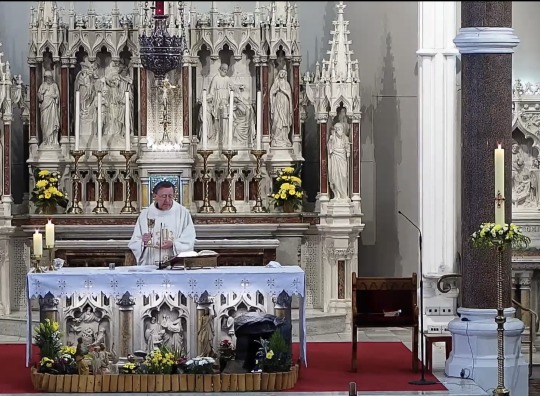
8th May >> Fr. Martin’s Gospel Reflections / Homilies on John 15:18-21 for Saturday, Fifth Week of Eastertide: ‘A servant is not greater than his master’.
Saturday, Fifth Week of Eastertide.
Gospel (Except USA)
John 15:18-21
The world hated me before it hated you.
Jesus said to his disciples:
‘If the world hates you, remember that it hated me before you. If you belonged to the world, the world would love you as its own; but because you do not belong to the world, because my choice withdrew you from the world, therefore the world hates you. Remember the words I said to you: A servant is not greater than his master. If they persecuted me, they will persecute you too; if they kept my word, they will keep yours as well. But it will be on my account that they will do all this, because they do not know the one who sent me.’
Gospel (USA)
John 15:18-21
You do not belong to the world, and I have chosen you out of the world.
Jesus said to his disciples: “If the world hates you, realize that it hated me first. If you belonged to the world, the world would love its own; but because you do not belong to the world, and I have chosen you out of the world, the world hates you. Remember the word I spoke to you, ‘No slave is greater than his master.’ If they persecuted me, they will also persecute you. If they kept my word, they will also keep yours. And they will do all these things to you on account of my name, because they do not know the one who sent me.”
Reflections (6)
(i) Saturday, Fifth Week of Easter
In today’s first reading, Luke, the author of the Acts of the Apostles, gives us a strong sense of the early church being guided by the Holy Spirit. Paul and his companions travelled through the countryside of the Roman province of Galatia, having been told by the Holy Spirit not to preach the word in the Roman province of Asia, both provinces being in modern-day Turkey. The Spirit would not allow them to cross into the province of Bithynia either, so, instead, they came to the city of Troas, on the North West coast of modern-day Turkey. There Paul experienced the prompting of the Spirit once more in the form of a vision in which a person from Macedonia in Northern Greece called on Paul and his companions to come over and help them. Luke was showing that the Holy Spirit was guiding the early church, especially the missionary journeys of Paul. We can be confident that the Holy Spirit continues to guide the church today. The church is not just a human organization, a kind of religious multi-national corporation. Yes, it has elements that are typical of any world-wide organization. It is a human institution. More fundamentally, however, the church is a spiritual reality. The risen Lord, through the Spirit, is present in the church, shaping it and guiding it. The church cannot be shaped by opinion polls. It can only be shaped by the Lord and his Spirit. Sometimes, as Jesus says in the gospel reading today, this will put the church into conflict with the prevailing culture, ‘if they persecuted me, they will persecute you too’. The church is in the midst of the world, but it is not of the world. As Jesus declares in that gospel reading, ‘you do not belong to the world’. The really important question for the church is not, ‘what do people think of us?’ but ‘what is the Lord saying to us’ or ‘Where is the Spirit leading us?’ Answering those questions requires prayerful discernment from us all.
And/Or
(ii) Saturday, Fifth Week of Easter
We have become very aware in recent times of Christians who suffer for their belief in Jesus, especially in parts of the Middle East. Many have been put to death because of their refusal to renounce their Christian faith. In this morning’s gospel reading, Jesus is speaking to his disciples on the night before his own execution, his crucifixion. He warns his disciples and all future disciples that if the world persecutes him, it will persecute them. The term ‘world’ here is shorthand for those in the world who have said ‘no’ to Jesus and his message. We are not likely to be persecuted in this part of the world in the way that Jesus and many of his first followers were, and many of his followers today are. Yet, we can experience more subtle forms of hostility and rejection, to the point where we can be afraid to witness publicly to the values of Jesus and of the gospel. We can be very tempted to keep our head down and to stay silent. We can be intimidated by the forces at work in the culture that appear to be so intolerant of any form of religious faith and of any institution that promotes it. We have been reading from the Acts of the Apostles in our first reading this Easter Season. What often comes across in the story of those early Christians is their courage in the face of hostility. They seemed to rely not on themselves but on the Holy Spirit, the Spirit of the risen Lord, whom they experienced within and among themselves. This same Holy Spirit is available to us all. We need the Spirit if our faith is to be as courageous as that of the first believers.
And/Or
(iii) Saturday, Fifth Week of Easter
Saint Patrick in his Confession writes that sometime after he returned to Britain having escaped from captivity in Ireland he had a vision one night in which he saw a man named Victor who had come from Ireland with a large number of letters. In the vision this man gave Patrick one of the letters and Patrick read the opening words of the letter which were, ‘the voice of the Irish’. At the same time, Patrick began to hear the voice of those who lived near where he had been held captive and they shouted, ‘We ask you, boy, come and walk once more among us’. I was reminded of that section of Patrick’s Confession by this morning’s first reading. According to our reading, one night Paul had a vision while in Troas, which is in north western Turkey. In that vision a Macedonian appeared and appealed to him, ‘Come across to Macedonia and help us’. Macedonia is in northern Greece. Both Patrick and Paul responded to the calls they heard and as a result those who had never heard the gospel came to know Christ. We are all called by God in some way or other; we are always trying to discern the call of the Lord in our lives. One thing we can be sure of is that insofar as we respond to the Lord’s call to us, the lives of others will be greatly blessed.
And/Or
(iv) Saturday, Fifth Week of Easter
John’s gospel speaks about God’s love for the world. God so loved the world that he sent his only Son. In today’s gospel reading Jesus speaks about the world’s hatred for him and for his followers. In Luke’s gospel Jesus calls on his disciples to love their enemies and to do good to those who hate them. The gospels suggest that Jesus was realistic about the hostility that would come his own way and the way of his followers. Yet, he wanted his followers to relate to the world not on the basis of how the world relates to them but on the basis of how God and Jesus relate to the world. In the gospel reading Jesus says, ‘A servant is not greater than his master’. That can be read in two ways. One way is, ‘if the master experienced hostility so will the servants’. The other way is, ‘if the master washed the feet of the servants, including the feet of Judas, the one who betrayed him, the servants must do likewise; they must reveal the love of God to others regardless of how they relate to them’. That saying of Jesus, ‘a servant is not greater than his master’ gives us much to ponder. It is only with the help of the Holy Spirit that we can be like the master in every respect.
And/Or
(v) Saturday, Fifth Week of Easter
In the gospel reading this morning Jesus tells his disciples on the night before he died that they can expect the same hatred from the world that he himself has experienced. In that regard, as in others, he remarks that a ‘servant is not greater than his master’. We know that Christians are being persecuted in many parts of the world at present. There has been persecution of the church in China for many decades. In the Maoist era, Catholics were forced to go underground. Mao’s late wife once said, ‘Christianity in China has been confined to the history section of the museum. It is dead and buried’. Thankfully, China’s Christians have greater liberties now than in the past. Yet, those Catholics who recognize the Pope rather than the state-backed Catholic Patriotic Association are liable to persecution and harassment. In a letter written to the faithful of the Catholic church in China in May 2007, Pope Benedict XVI expressed the hope that this day, May 24, would become a day of prayer for the church in China. The Pope chose this day because is the memorial of Our Lady Help of Christians, who is venerated with great devotion at the Marian shrine of Sheshan in Shanghai. The statue of Our Lady Help of Christians at the shrine is very striking. Our Lady holds the child Jesus high above her head; the child’s hands are extended straight out to left and right symbolizing his death on the cross and the overcoming of his death with his resurrection. These outstretched arms are also a symbol of love for all humanity. We remember to pray for the church in China today and we also ask the Lord to make us more courageous in bearing witness to him in our own time and place.
And/Or
(vi) Saturday, Fifth Week of Easter
There is something of a contrast between today’s first reading and today’s gospel reading. The first reading from the Acts of the Apostles gives us a very positive picture of Paul’s ministry in what is now Turkey. Luke, the author, tells us that ‘the churches grew in faith, as well as growing daily in numbers’. They were growing in both quality and numbers. Paul reaches Troas which is on the north-west coast of modern day Turkey, and there he has a dream in which he hears the people of Macedonia, in Northern Greece, call out to him to preach the gospel among them. Paul immediately makes plans to cross from what we would call today Asia, Turkey, to Europe, Greece. This is the moment when the gospel reaches Europe for the first time, probably less than twenty years after the death and resurrection of Jesus. Luke gives us a sense of the Holy Spirit at work guiding Paul and his companions, charting their course. It is a very encouraging picture. However, in the gospel reading Jesus paints a somewhat bleaker picture. He tells his disciples that just as the world, the world of unbelief, has hated him, so it will hate them. A servant is not greater than his master. As they persecuted the master, Jesus, they will persecute the servants, his disciples. If Luke in the first reading depicts the work of the Spirit, the gospel reading depicts hostility to that work. Both these realities will always be a feature of the church’s life and mission. What matters is that in the face of the hostility to the gospel message, we never lose sight of the Spirit at work within us and among us.
Fr. Martin Hogan.
2 notes
·
View notes
Text
My Sunday Daily Blessings
May 14, 2023
Be still quiet your heart and mind, the LORD is here, loving you talking to you...........
Sixth Sunday of Easter (Roman Rite Calendar) Lectionary 55
First Reading:
Acts 8:5-8, 14-17
Responsorial Psalm:
Ps 66:1-3, 4-5, 6-7, 16, 20
Second Reading:
1 Pt 3:15-18
Verse Before the Gospel:
Jn 14:23
**Gospel:
Jn 14:15-21
**Reflection:
What makes us both fully human and truly like God? Is it not unconditional love which is unselfish, undying, and wholly directed to the good of others? The love of God unites us in an unbreakable bond of fidelity, friendship, and community with others. Jesus loved his own until the very end of his passion and death on the cross (John 13:1).
The nature of love From the very beginning of creation God said: it is not good that man should be alone (Genesis 2:18). We were created in love for love - to be a community of loving persons, just as the Father, Son, and Holy Spirit are inseparably united in a community of unbreakable love.
John Henry Newman (1801-1890) said: We love because it is our nature to love, and it is our nature because God the Holy Spirit has made it our nature. Jesus speaks to his disciples of the inseparable bound of love between himself and the Father, and of their love for humankind. In Jesus we see the fulness of God's love and how God's love is directed to our well-being. In this the love of God was made manifest among us, that God sent his only Son into the world, so that we might have life through him (1 John 4:9).
Knowing God's love How do we know that God truly loves each one of us? In the cross we see the proof of God's love for each of us and the incredible price God was willing to pay to redeem us from slavery to sin, death, and Satan. Jesus gave up his life that we might have life - abundant, everlasting life with God - a life of love and unity with the Father, Son, and Holy Spirit forever.
Through the cross Jesus opened a new way of relationship for us as the adopted sons and daughters of God - his beloved children (Romans 8:14-17). Jesus calls his disciples to walk in his way of love through obedience to the will of the Father. True love is more than sentiment, emotion, or good intention. As important as these may be they are not the proof of sincere love. True love for God is expressed in obedience and obedience is expressed in love.
Jesus' best gift for us Jesus promised to give his followers the best of gifts, the Holy Spirit as their Counselor and Helper. How does the Holy Spirit help us as the counselor? Counselor is a legal term for one who defends someone against an adversary and who guides that person during the ordeal of trial. The Holy Spirit is our Advocate and Helper who guides and strengthens us and brings us safely through the challenges and adversities we must face in this life.
The Holy Spirit is also the Giver of life - the abundant life which comes from God and which sustains us forever. The Holy Spirit also guides us in the way of truth, wisdom, and goodness. We can never stop learning because the Spirit leads us more and more into the knowledge of God's love, truth, and goodness. Jesus also promised his followers the gift of peace. Peace is more than the absence of conflict or trouble. Peace includes everything which makes for our highest good. Trust in God, faith in his promises, and obedience to his word lead us to peace and security in God's presence. That is why a Christian need not fear or be troubled by anything. The love of Christ brings immeasurable joy and consolation even in the midst of our trials and suffering. Paul the Apostle states,
"Who shall separate us from the love of Christ?... For I am sure that neither death, nor life, nor angels, nor principalities, nor things present, nor things to come, nor powers, nor height, nor depth, nor anything else in all creation, will be able to separate us from the love of God in Christ Jesus our Lord" (Romans 8:35,38-39).
Ask the Holy Spirit to fill you with the knowledge of Christ's immense love and with his gift of peace.
O God, you are the unsearchable abyss of peace, the ineffable sea of love, the fountain of blessings and the bestower of affection, who sends peace to those who receive it. Open to us this day the sea of your love and water us with abundant streams from the riches of your grace and from the most sweet springs of your kindness. Make us children of quietness and heirs of peace; enkindle in us the fire of your love; sow in us your fear; strengthen our weakness by your power; bind us closely to you and to each other in our firm and indissoluble bond of unity. (ancient prayer from Syrian Clementine liturgy)
Sources:
Lectionary for Mass for use in the Dioceses of the United States, second typical edition, copyright (c) 2001, 1998, 1986, 1970 Confraternity of Christian Doctrine; Psalm refrain (c) 1968, 1981, 1997, international committee on english in the liturgy, Inc All rights reserved. Neither this work nor any part of it may be reproduced, distributed, performed or displayed in any medium, including electronic or digital, without permission in writing from the copyright owner.
**Meditations may be freely reprinted for non-commercial use - please cite: copyright © 2023 Servants of the Word, source: dailyscripture.net, author Don Schwager.
0 notes
Text
04/09/2020 DAB Transcript
Deuteronomy 33:1-29, Luke 13:1-21, Psalms 78:65-72, Proverbs 12:25
Today is the 9th day of April welcome to the Daily Audio Bible I am Brian it's great to be here with you today as we take the next step forward in the Scriptures and the next step forward in this week. This is a week that's known as holy week and it leads us to Easter. And, so, on this day, this Thursday, this Maundy Thursday as it's known, we take time to commemorate to consider that Jesus had a last supper, like the last meal, right? The last meal before He would suffer. And at that meal He would disrobe and get down on his knees and wash the filth from the feet of His disciples setting about a precedent that is supposed to be our normal, one in which we step down and understand that the position here of our heart and of our lives is to be the servant, to wash the filth from the feet of those around us, as it were. And, so, that's…that's today and that's kind of what we put in our hearts today as we move through this week. And, so, let's do that. Let’s have that in our hearts as me move through the Scriptures today and into our day. So, we’re reading from the book of Deuteronomy in the Old Testament, which we will conclude tomorrow on Good Friday and move into the next book, which is called Joshua and really the next generation, the next era of the story that we’ve been telling from the beginning, the origin story and the formation story of the ancient Hebrew people that's found in the Hebrew Scriptures. And today Moses's will pronounce some final blessings. We’re reading from the Christian Standard Bible this week. Deuteronomy chapter 33.
Commentary:
Okay. So, Jesus said a number of things as we read through the 13th chapter of Luke today and all of it is so poignant for the time of the year that we’re in as we’re moving toward the end of the Lenten season and toward Easter. And I’ve mentioned lent a few times along the way. It's just a…it's a season on the Christian calendar that lets us sit with the sin of our lives and what it cost to bring us freedom, but it's also a time of fasting usually. It's…it's a time of openness before God. The way that it’s supposed to work is that we sit before God, wide-open. “Lord, I sit humble, I sit repentant. I realize what you have done for me and I realize how I've taken that gift and try to make something of it out of my life. I'm sitting here open before you. Whatever you want to remove from my life, nothing is off limits. Whatever you want to put into my life that I need, to have eyes to see and ears to hear and walk the narrow path, then insert that into my life. Whatever needs to be arranged in my priorities however they have been pulled out of whack because the chaos of life just does that to me, I'm inviting you in this season to…to rearrange my life however it needs to look so that as I celebrate resurrection, and as I realize that I am a participant in resurrection that I go out of this season reoriented to the truth of who I am because of your sacrifice.” That's basically what we've been doing for this season and that's coming to a close on Saturday and then we celebrate Easter and resurrection morning. So, what words can we hear from Jesus that aims us in this direction from the gospel of Luke today. First, He talks about a couple of incidents that I…the word viral is the word that I’ve been using for the last few years because it's something that we can understand. Some things happened that were bad things and they went viral because word-of-mouth spread all over the countryside. This is the stuff people were speaking of. Basically, in the temple, Pilate had his eyes on some people that were seen as zealots, kind of a version of terrorists for their day and they were following him around and this stuff still happens today, and they took him out. They took him out in the temple and their blood, because they were killed, he was interspersed with the sacrifice that was happening and this was like a very big deal. Kind of stuff that people would be talking about. Another was the tower in Siloam fell and 18 people died. And like, I’m thinking to last month, you know, we had lots…we had tornadoes come through here and roughly the same amount of people died. And, so, you can see kind of the kind of impact that has on a community. And, so, people are talking about it. We have a lot more advanced technology and different ways of talking about it now but people were talking about it. Jesus response to these things is, “were they worse people? Like is that why this happened, they were worse people?” And He denounces that, “no I tell you.” So, no this didn't happen to them because they were worse people. But then He does something interesting, He doesn't then explain why it did happen, which is like the cosmic question of the ages. He didn't go there at all. He simply said, “repent, repent. Unless you repent, you’re all gonna perish in some way. There is no one way greater than another way and it’s not because of the how bad these people were that tragedy fell upon them. We’re all headed for the same place unless we repent.” That could not possibly be more poignant to our lives in this week where we are observing Easter. Repent. Remember that you are ashes to ashes and dust to dust. Remember that there is no way for you to save yourself but in repenting. And repent is…it's a heavy word because it should be. But what it means at its core is that you have become willing to reverse course, that you are willing to change your mind, that you are willing to allow change to happen within you that changes the trajectory of your path. So, Jesus says, “do you think that these Galileans were more sinful than all the other Galileans, because they suffered these things. No, I tell you, but unless you repent you will all perish as well.” Next, Jesus told…tells a parable about a barren fig tree that…that the owner of the vineyard wanted to cut down because it had gone for years without bearing any fruit. And the gardener comes and says, “let me work with it. Give it one more year. Let me work with it and see if we can't get this to bear fruit in the next year.” And Jesus is showing us the patients, the kindness of God as we move toward repentance. So, yes He's calling us to repent but He's also giving us a glimpse into the fact that our Father has been cultivating the soil all around us and feeding it and making it nourishing out of His patients and kindness when we should've been cut down long ago. And all this disruption that we’ve been facing, all the stuff that we’ve been shaking our fist at the sky, all the sudden we realize God has been doing these things. He's been disrupting the soil around us and feeding it and nourishing it so that one day we could repent and one day we could bear fruit for His kingdom. The very next scene is Jesus in this synagogue and there's a woman and she's been bent over for 18 years. That's our story, my friends. Life has doubled us over. We’ve been walking around bent at the waist, looking at the ground with our arms behind us trying to make it through but all we see is the ground before us. We don't have eyes to see. And here's Jesus saying, “straighten up. Stand up straight. You've got this. Stand up straight. Even if this is on the wrong day, even if this is breaking the rules, stand up straight. I have been cultivating the soil all around you for so long so that you could come to this moment where you can change your mind, where you could repent. Now, stand up straight. You don't have to be in this bondage anymore.” And the thing about the story of Jesus healing this woman is that the synagogue people were mad. They were like, “there’s six other days to do this. Don't come over here on this day and try to get healed.” And Jesus calls out the hypocrisy, the same kind of hypocrisy we display when we see God moving in ways that we don't understand or through people that we do not agree with. And Jesus just doesn't seem to give a care at all. So, we can deduce then that doing of the will of God to bring freedom and healing will not abide by the rules that we've made, the box that we've made for God to dwell in. He has no interest. He will heal and restore as He pleases no matter what we think about it. And then He ends with, “what is the kingdom like? How do I describe the kingdom?” And He describes it like a mustard seed, a little tiny seed the grows up into a tree and birds can build nests…nests in that tree or it's like a woman who put Levin in 50 pounds of flour until it was all mixed in, which will completely change the composition of whatever is made with that flour. So, there's a lot for us here today. Some of the struggles that you may have been going with may need to be reinterpreted. Maybe your Father has been gardening. Maybe He's been cultivating the soil all around you so that you might come to a sense, a moment of clarity where you can repent and wake up and realize you don’t have to be stranded doubled over with your face to the ground anymore. You can stand up tall and straight and be the light of the world that you were created to be. And that might get you in hot water with some people who don't understand you or understand what you're doing. They may even reject you or come against you in some way, but that's just because you're not obeying their rules. But once you've stood up straight and have eyes to see, and you can begin to see this kingdom that is thriving and growing up all around us then you stop caring about those sorts of things. You realize that the darkness is always going to try to negotiate in some way to diminish the light because the light exposes what's in the dark.
Prayer:
Father, so much here just for the way that we should be in this world and we thank You for the gift of it arriving right here at this time where we contemplate You living all of this out by having this Last Supper and breaking this bread and saying “this is my body that is broken for You” and passing the cup and saying “this is the cup of salvation” and lowering Yourself before Your friends and washing their feet. This day alone gives us an entire trajectory for our lives where we should be aiming, and it gives us permission to walk that path. And, so, come Holy Spirit forgive us for all of fear of stepping out of the boat and onto the water and walking with You. We’ve been too busy on the shore trying to stay with the pack, trying to stay with everybody else but the thing is, You're inviting us into the deep. You are transforming us, and we believe that. And, so, come Holy Spirit we pray into all that we've read and all that we've discussed today we ask in the name of Jesus. Amen.
Announcements:
dailyaudiobible.com is the website, its home base, its where you find out what’s going on around here.
And, you know, we’re talking about it being Holy Week and today's, you know, Maundy Thursday, a day celebrating the last supper. Tomorrow is Good Friday and we commemorate and observe the…the crucifixion of Jesus's death on the cross. And then we’ll move through Holy Saturday and Easter Sunday and it might look a little different this year than in any other year. I know it's gonna look different than any other year than I can remember. The world is trying to go virtual and yet we've been virtual all long for these 15 years. And, so, we’ll be here. We’ll be moving the next step forward to the Scriptures, but we’ll be here together as a community commemorating these events and focusing and aiming our hearts in the directions that we should be contemplating on. So, I don't suppose I'm any less looking forward to moving through this. It's the most important celebration we have as believers in Jesus. And, so, I'm excited that we can continue our journey forward together as a community and observe Good Friday and Easter Sunday together like…like we always do.
Tomorrow’s also…I mean its Good Friday, but it's also kind of a special day in this community. So, like a couple days ago is soft launched a major, major huge update, like a six month long huge update to the Daily Audio Bible app and infrastructure, one that finally brings us to a place that we been dreaming of getting to for like nearly 5 years and that's…that's not an understatement, like that's how long it's been and just kind of building up this platform centered around the rhythm that we have is a community here. So, tomorrow where gonna reach a milestone. Tomorrow we will finish the Torah or the Pentateuch, and now if you have the latest update to the app and if you don't, you should get it right away, like it's gonna stabilize so many things. But built into this, if you’ve been kind of checking off the days that you've listened to as we move through the year, if you’ve been checking them off then tomorrow we’ll finish the Pentateuch and within the new app you'll find…like you’re gonna get a badge. It’s gonna tell you you've achieved this. And, so, like in the upper left-hand corner of the app, the little drawer icon in the app, when you click that drawer icon after you've updated to the new app, you’ll see a new line. It’s called achievements. And if you click that you can see your own personal progress as we’re moving through the different sections of the Bible. So, you can see the sections that we’re in and where we are in them. The sections…the sections that are yet to come and those that haven't begun yet. But it just helps us see where we are in the story, see how we’re moving through the Scriptures and every time we reach one of these milestones or these piles of rocks as the Bible calls them we can commemorate the fact that we've moved through another section and we've achieved completion of that section and the app will show us that we've done that by giving us the badge. So, if you’ve been checking off those days as we go through them, then yeah, we’re set to earn the first badges tomorrow. So, the newest latest version of the app is 1.1.40. And you can go to your app store, whether that is, you know, an iOS device, Apple device or its an Android device, download the latest version. That brings a huge amount of stability, like really the responsiveness of the app should be significant. We've worked for a couple of years after launching the first version of the app to get our feet under us and learn, you know, how to expand and contract and how to grow. And some of that work, it's been long long labor. And, so, now we’re here and starting to see some of the fruit of what we’d dreamed of in the first place, and continuing to build the app to be sort of the community center, the hub of what we do here as a community around the Global Campfire. So, enough said about that, that's coming tomorrow but you should update your app to the latest version because that's paving the way for a lot of technology in the future. So, check that out.
If you want to partner with the Daily Audio Bible, you can do that at dailyaudiobible.com. In this time of weirdness in the world, I can’t possibly thank you enough for your partnership. We wouldn't be here if we weren't in this together. That has always been the case. It is the case now. Thank you for your partnership. So, there's a link on the homepage. If you’re using the Daily Audio Bible app, you can press the Give button in the upper right-hand corner or, if you prefer, the mailing address is PO Box 1996 Spring Hill Tennessee 37174.
And, as always, if you have a prayer request or encouragement, you can hit the Hotline button in the app, or you can dial 877-942-4253.
And that's it for today. I'm Brian I love you and I'll be waiting for you here tomorrow.
Community Prayer and Praise:
Good morning family it is Monday April…oh come on come on maybe 5th maybe 6th…I don’t know…what day is it? Holy moly! Anyway, it’s Monday and I wanted to call to encourage everybody listening to find the beauty of spring where you are. More and more this morning I…I feel the pressure to allow the negative thoughts in but then I reflect back on my walk that I took yesterday and all of the little flower beds that are coming up and the crocuses that are alive and going crazy right now and…and the little buds on the trees Lord God, I just…I just cannot get enough, the little tulip trees with a soft velvety coating on their…on their buds. I just…every time I am tempted, well not every time, but every time I am tempted, I am working towards being able to say, “life is returning.” We had a mild winter this year but feels kind of like like we’re in the winter of the soul right now. And, so, I just praise you Jesus that signs of life are coming back and sneaking in and they’re so easy to overlook. We could just, you know, keep focused on what is wrong and not see the gift of spring that God is giving us. So, friends I encourage you today get outside, get outside of your head and just look, just look at the trees, look at the ground, look at the fact that life is coming back. And then my goodness, even the weeds that we don’t want to grow in our sidewalk cracks, even they are coming back. So, we…we will follow nature and God will give us the ability and the power to come back with more life in us than was before. So, I encourage you friends. This is Erin from Michigan get outside and enjoy the spring. It’s a gift from God. I love you. Have a great day. Peace.
Hi family this is Grateful to be a Mother and I’m calling in praying for everyone. I listen every day. I want to let a few people know that I miss you and am continuing to pray for you. Vivic’s mom, Bonnie, Walking by Faith, Salvation is Mine, hope to hear from all of you soon but just know that we are still praying for you. Joe the Protector, so glad to hear from you and I want to let you know that we are praying for you, praying for your daughters, praying for your family. Fearless from Florida or Georgia, it was good to hear from you and I want to let you know that I am continuing to pray for you. Joanne from Happy Valley, I love to hear your calls. I love your heart and I know that you feel like…we all need…we’re all in the process of…of being more of what the Lord wants us to be but truly the Lord is doing a good work in you. Rebecca in Michigan, I love hearing your calls. Micah in Awe thank you so much for sharing some of your testimony. It gives those of us with children that are still on the outside hope. Thank you and please continue to call. Duane from Wisconsin, praying for you and your family, for Mason and Nicholas. Thank you, Duane, Lisa the Encourage, Rosie, and all of you who pray for our children. Those prayers are needed and much appreciated. And Okie girl, I’m glad to hear from you again and just know that I continue to pray for your family. Thank you, family for being there. Thank you, Brian…
Hello DAB family this is Dimitri from Portland Oregon. Just calling in for prayer for my wife. The devil is going after our marriage and is trying to do everything he can to destroy and rip us apart. I pray for your guy’s prayers and support in this really difficult time. I really appreciate it.
Hello this is Sommer from Ohio it’s been a while since I called in. I’m calling tonight…well…this morning, it’s 3 o’clock, to ask for prayer for my daughter Valerie who is pregnant with her second child. And her first child is only nine months old and her husband is moving out this morning, later today. As she asked him too. And, I agree that he is not safe. And, so, it’s kind of a good thing that she has stood up for herself. However, it leaves her by herself and they’ve been together for four years, married for two. She is overwhelmed with facing being a single mother and with a failed marriage. Even though it isn’t at all her doing it still leaves her and the mess behind it. If you could pray for her, her name is Valerie. She is right now suffering. She’s depressed, she’s suicidal, she doesn’t want to keep the baby that she’s carrying. I…I don’t know what to do for her, I don’t know what to say to her. So, if you could please pray for her and for me, for wisdom. And if you could pray for my oldest daughter, Lindsay, that we…we kind of upset her last night and made her very angry with us and that harmed us a little bit. So, if you can please pray for Lindsay and Valerie and me, I’d appreciate it.
[singing begins] Ascribe greatness to our God the rock. His work is perfect, and all His ways are just. Ascribe greatness to our God the rock. His work is perfect, and all His ways are just. A God of faithfulness and without injustice. Good and upright is He. A God of faithfulness and without injustice. Good and upright is He [singing ends]. Good morning my name is Greg calling from Alaska. Bringing the song of Moses this morning. Today is April 7th, Passover begins tonight. My heart is like…I’ve been through a lot. I’ve been through a divorce, I’ve been remarried, I lost a business. God is faithful. And I hear people calling in and saying the hard things you’re going through right now. Father God I lift up my brothers and sisters who are struggling in their marriages, businesses are struggling. God You are our provision and we look to You to provide and watch over us. God bless you all.
I want to say a prayer for the…the boy that said his heart was callous and that he had evil thoughts coming into his head and I just wanted to give him some encouragement and say I’m sure that a lot of us feel that way and that I just want to pray that the devil just gets out of his ear and that…that he can just feel an overwhelming sense of peace and just give him comfort that, you know, that happens to all of us, that I’m sure all of us once in a while struggle with thoughts that we don’t want to have and, you know, that’s not something that we’re trying to have. I just want to give him a sense of comfort and a sense of peace that he can just deal with that and that the Lord can help him and give him comfort with that because it is something very hard that we all struggle with and I pray Jesus just really helps him in every way possible and just helps him feel like things like that will…will happen but not to feel guilty and not to feel terrible about it because that is the heart of a really good person from what I can hear. Amen.
3 notes
·
View notes